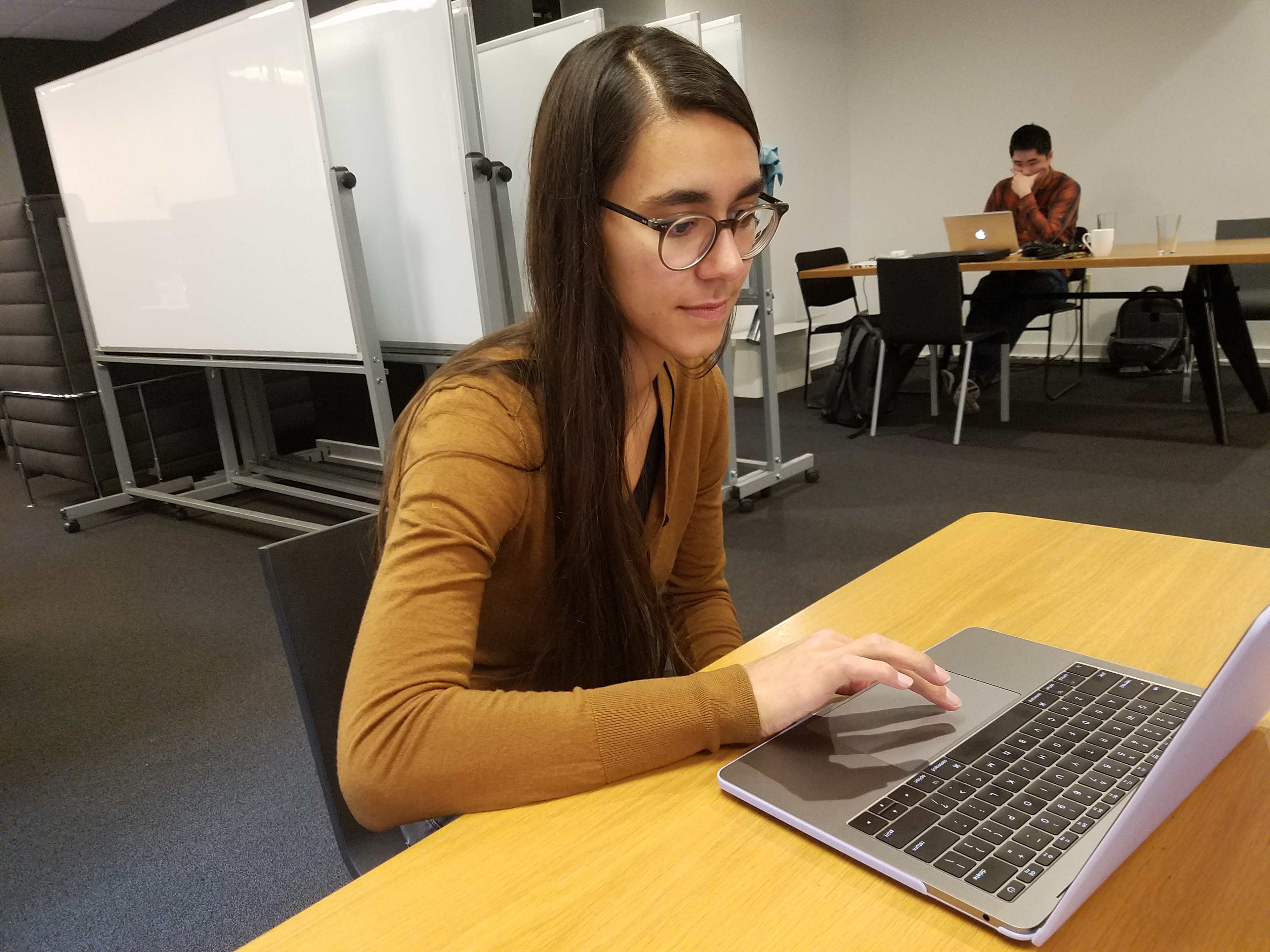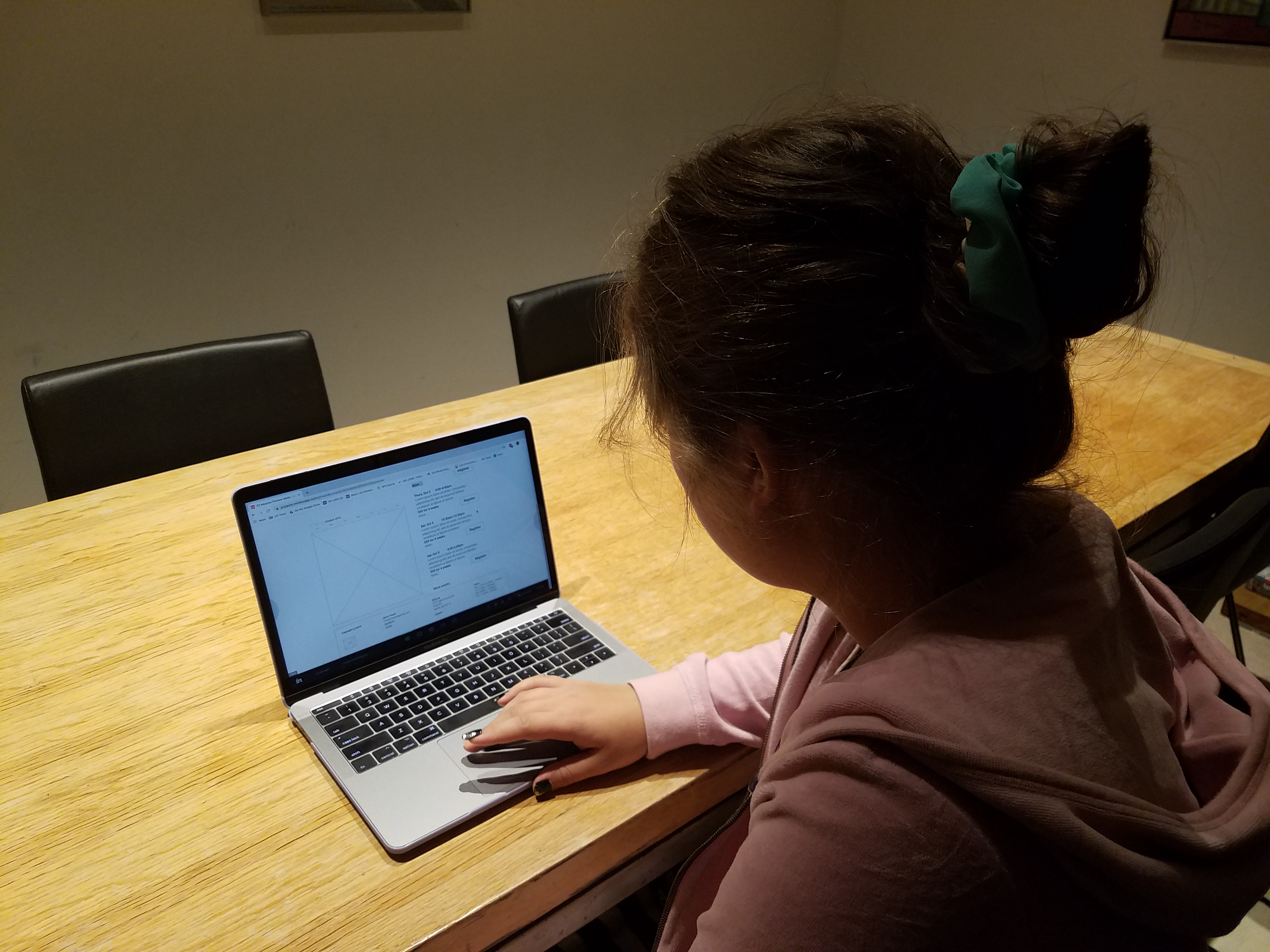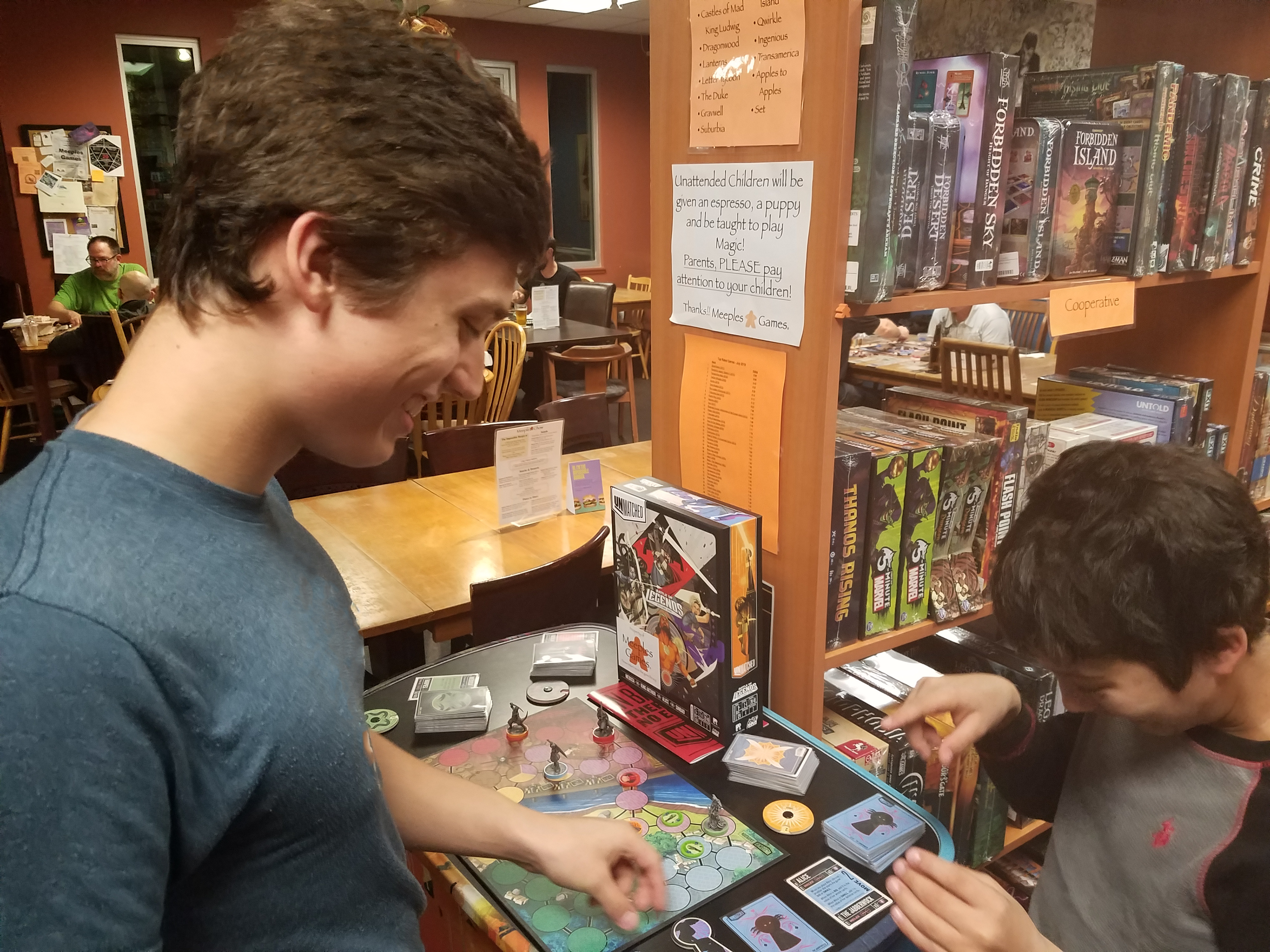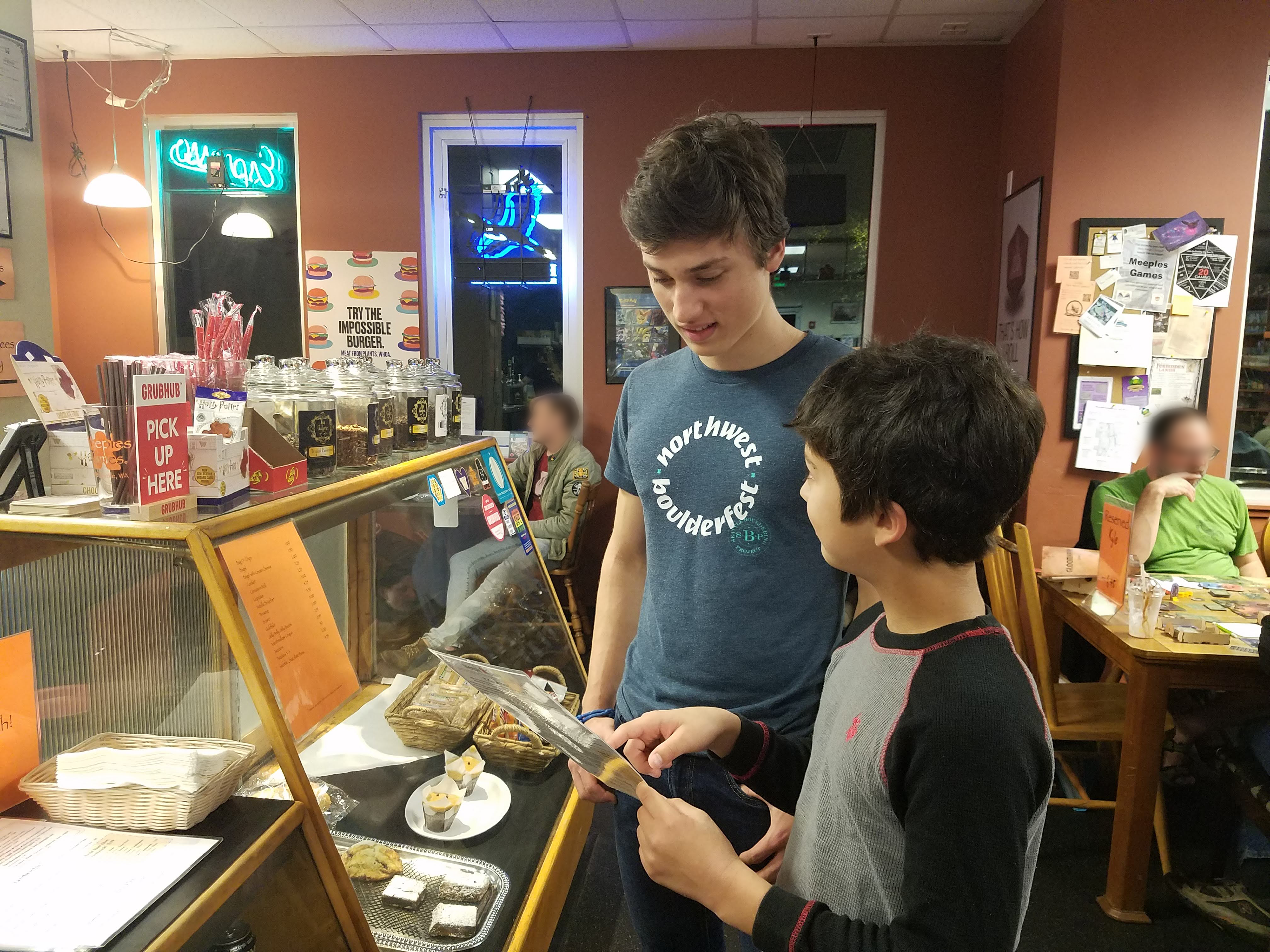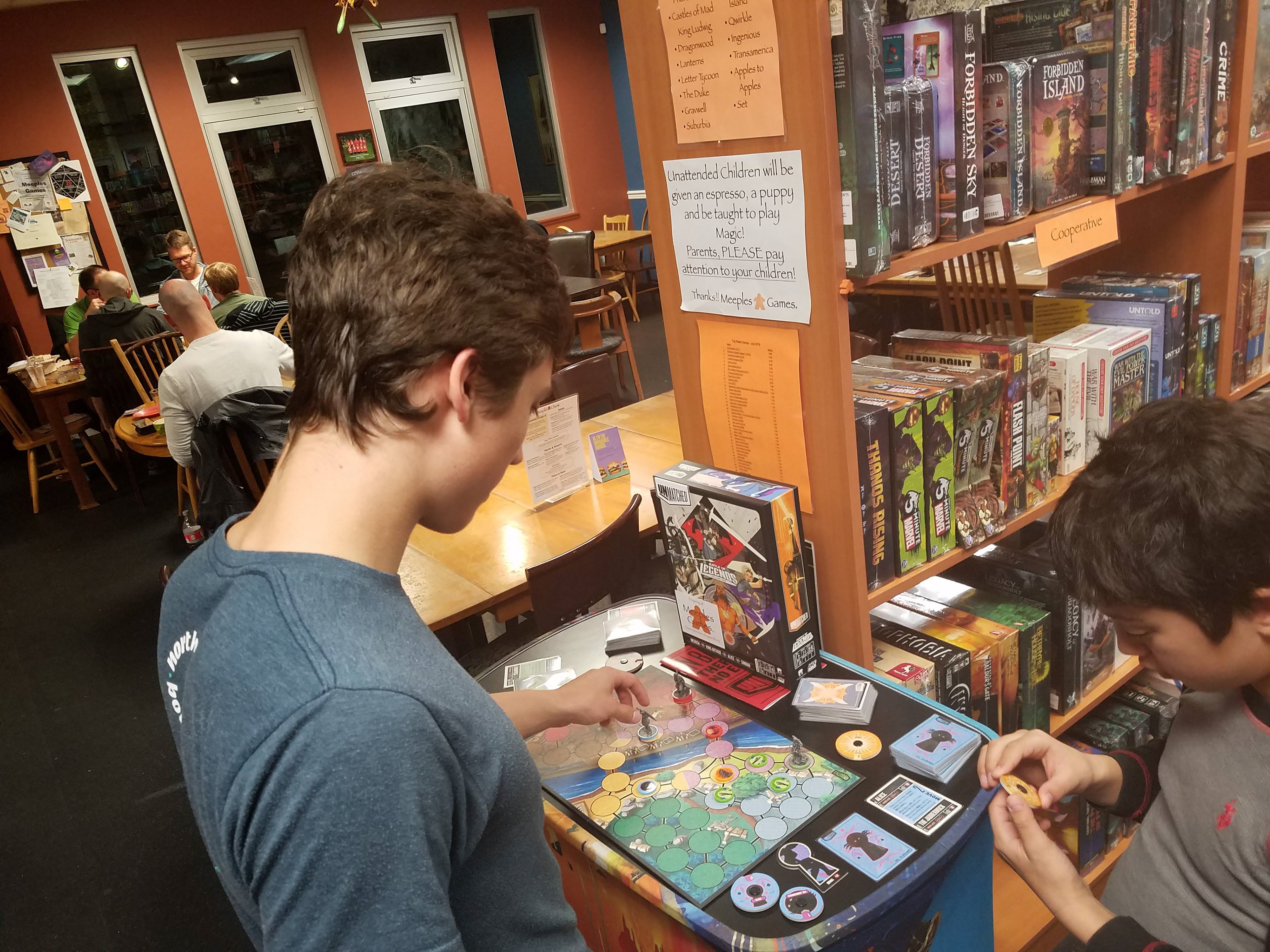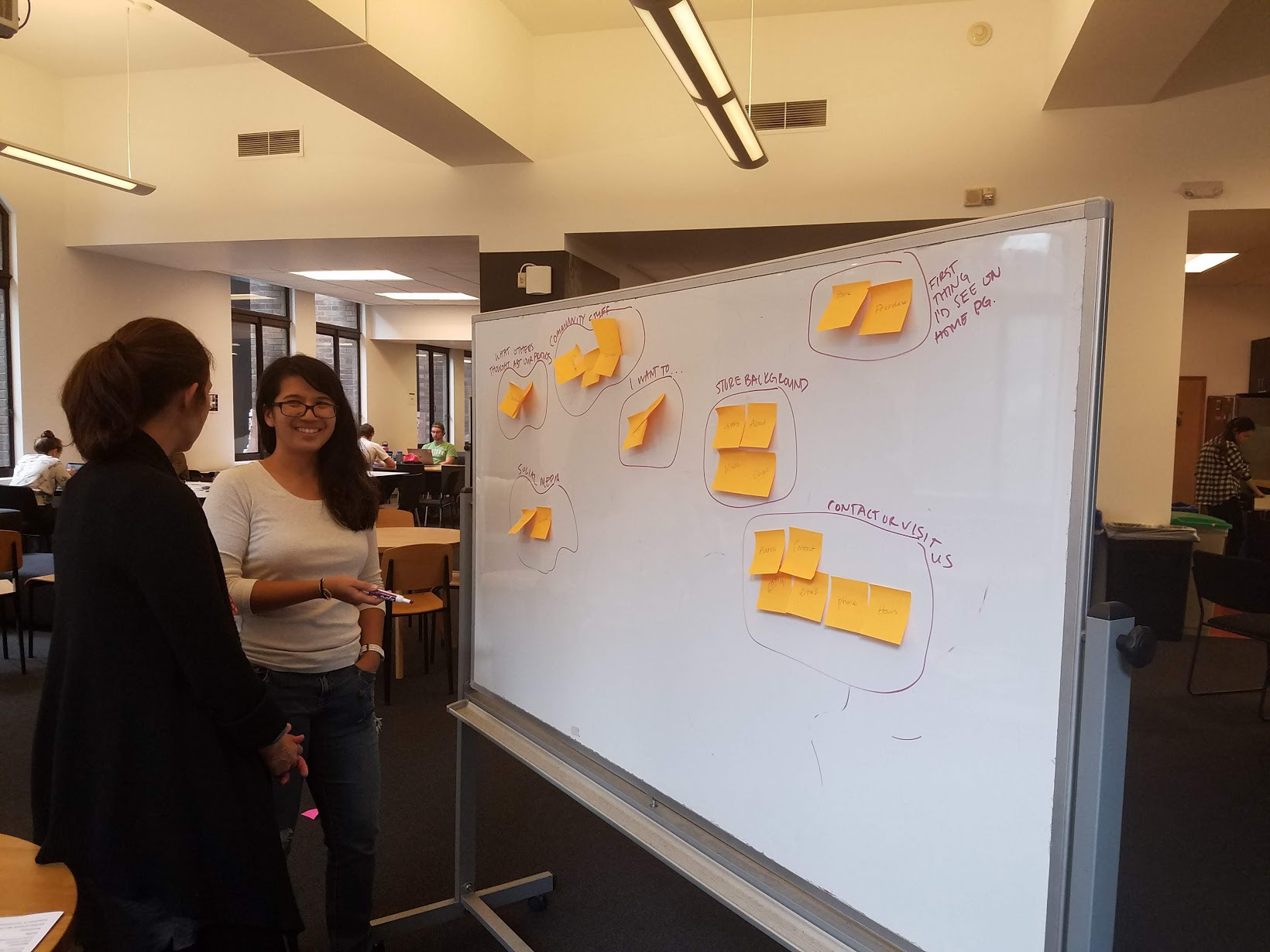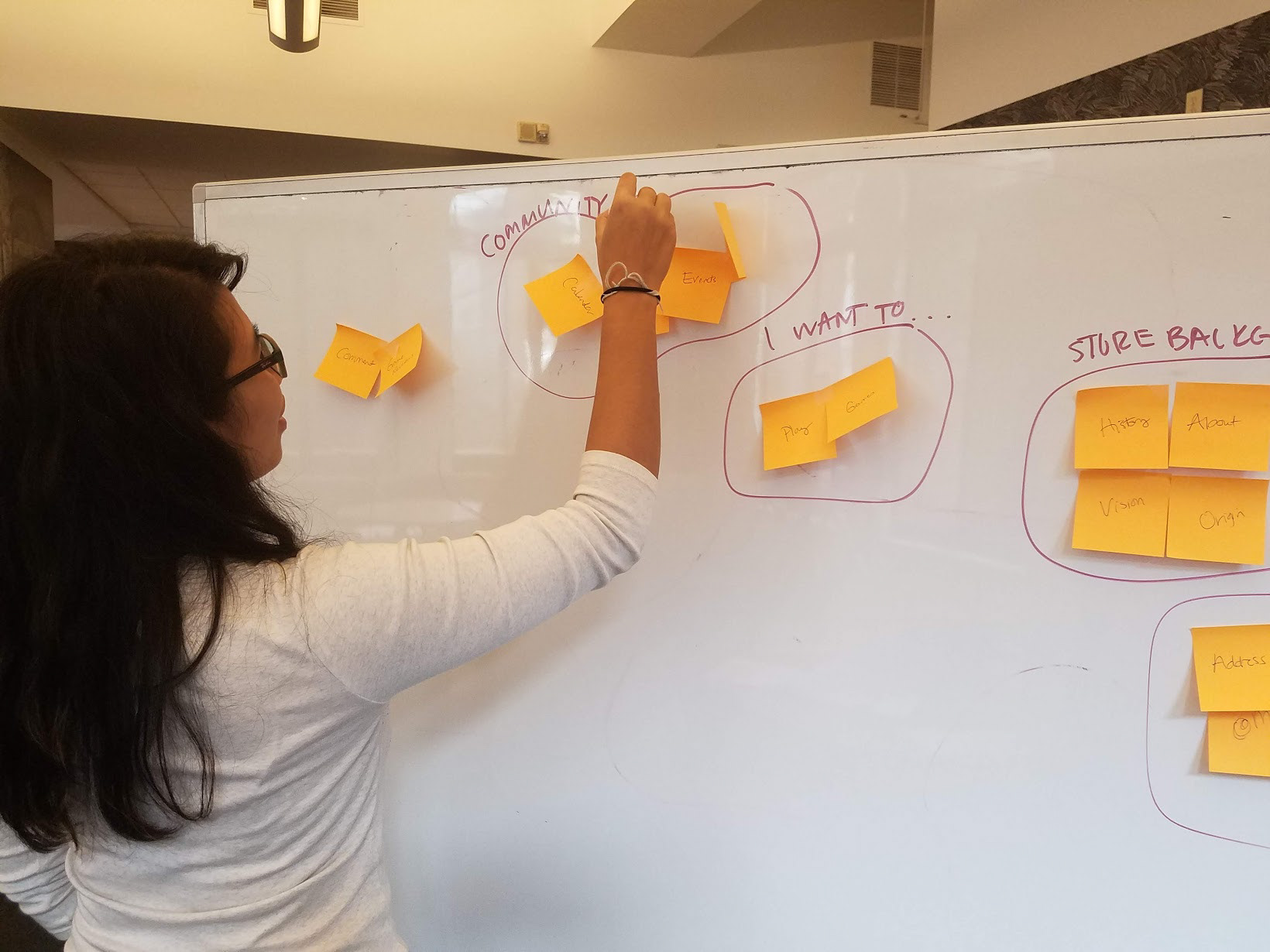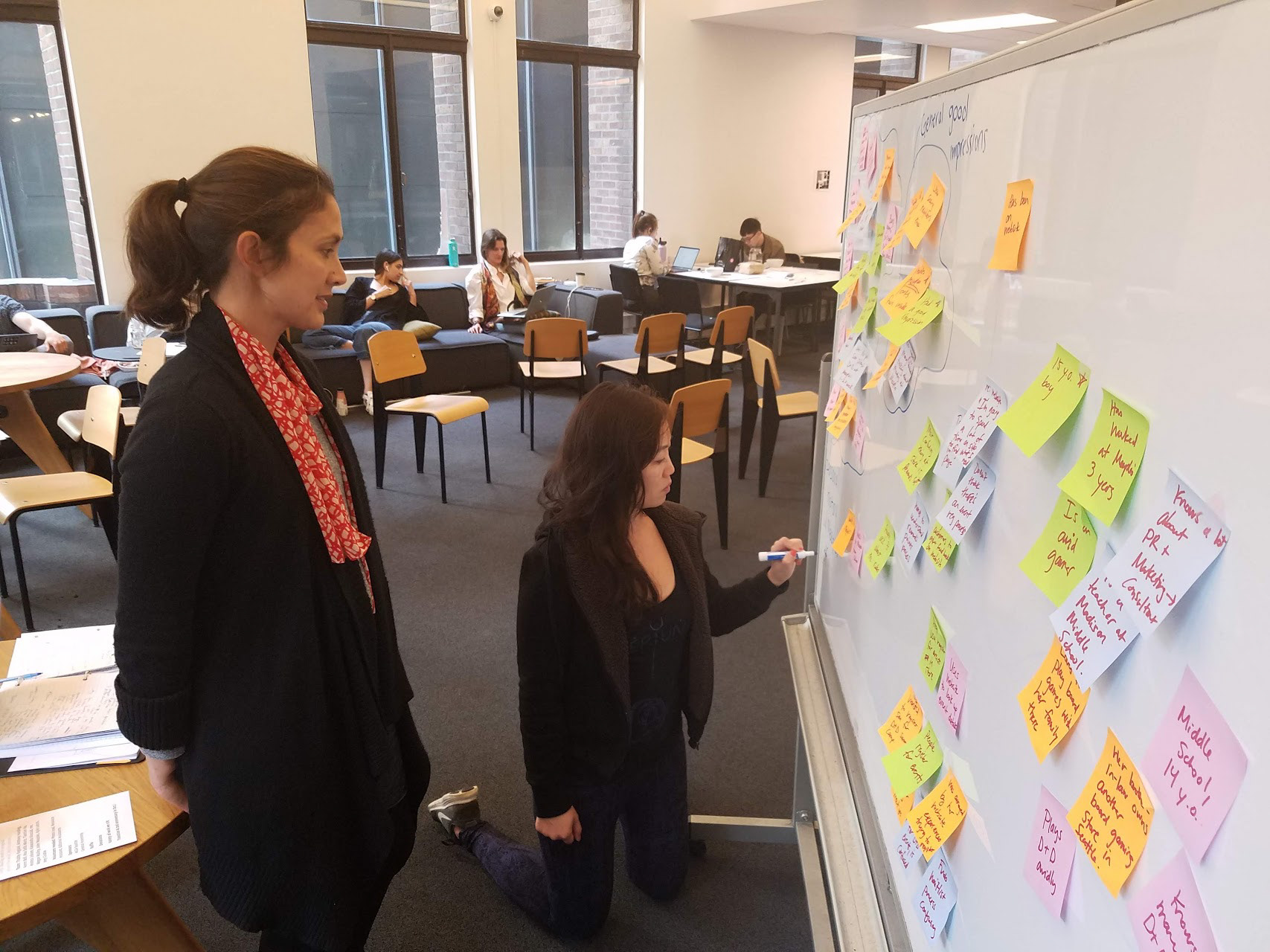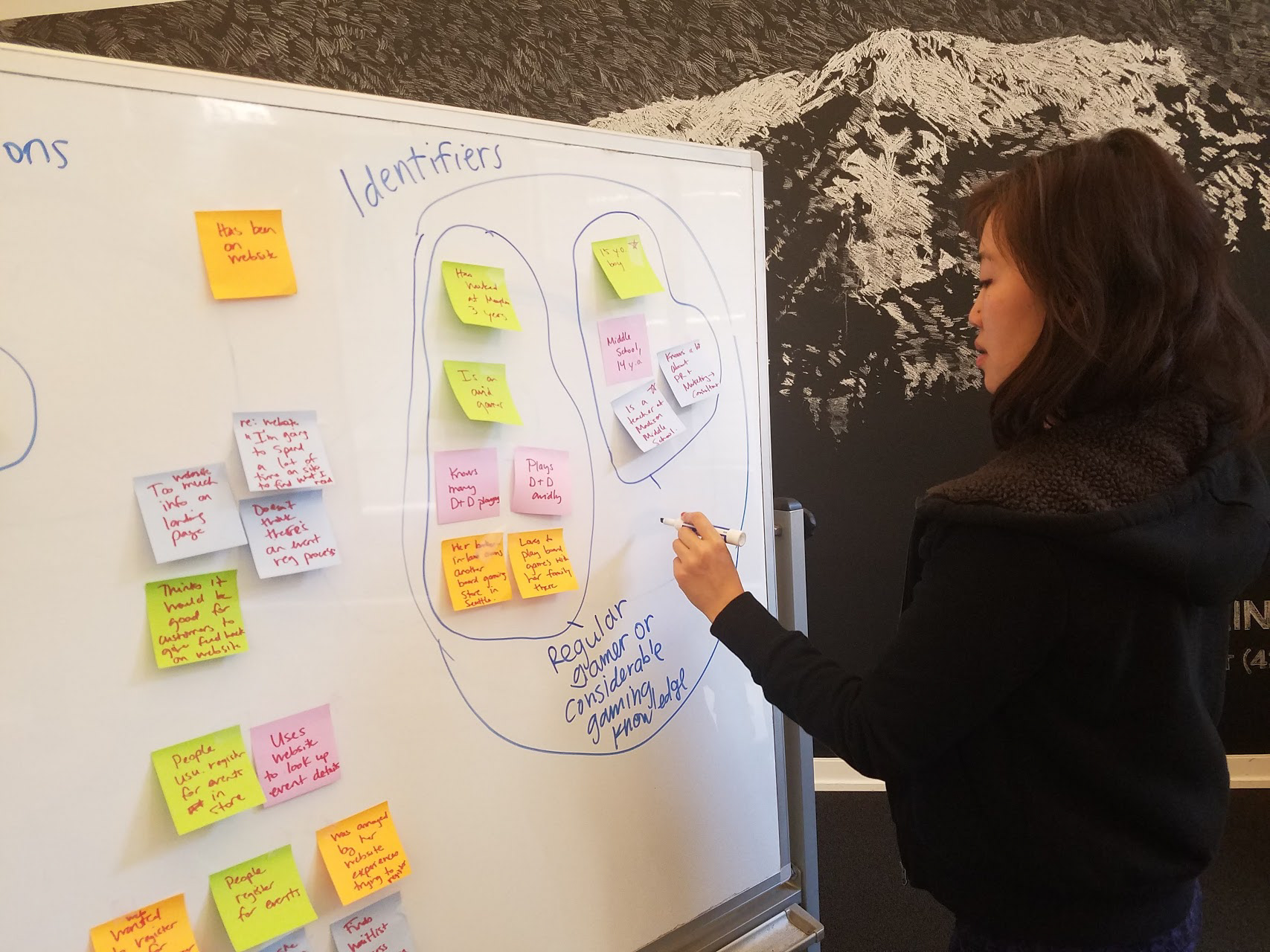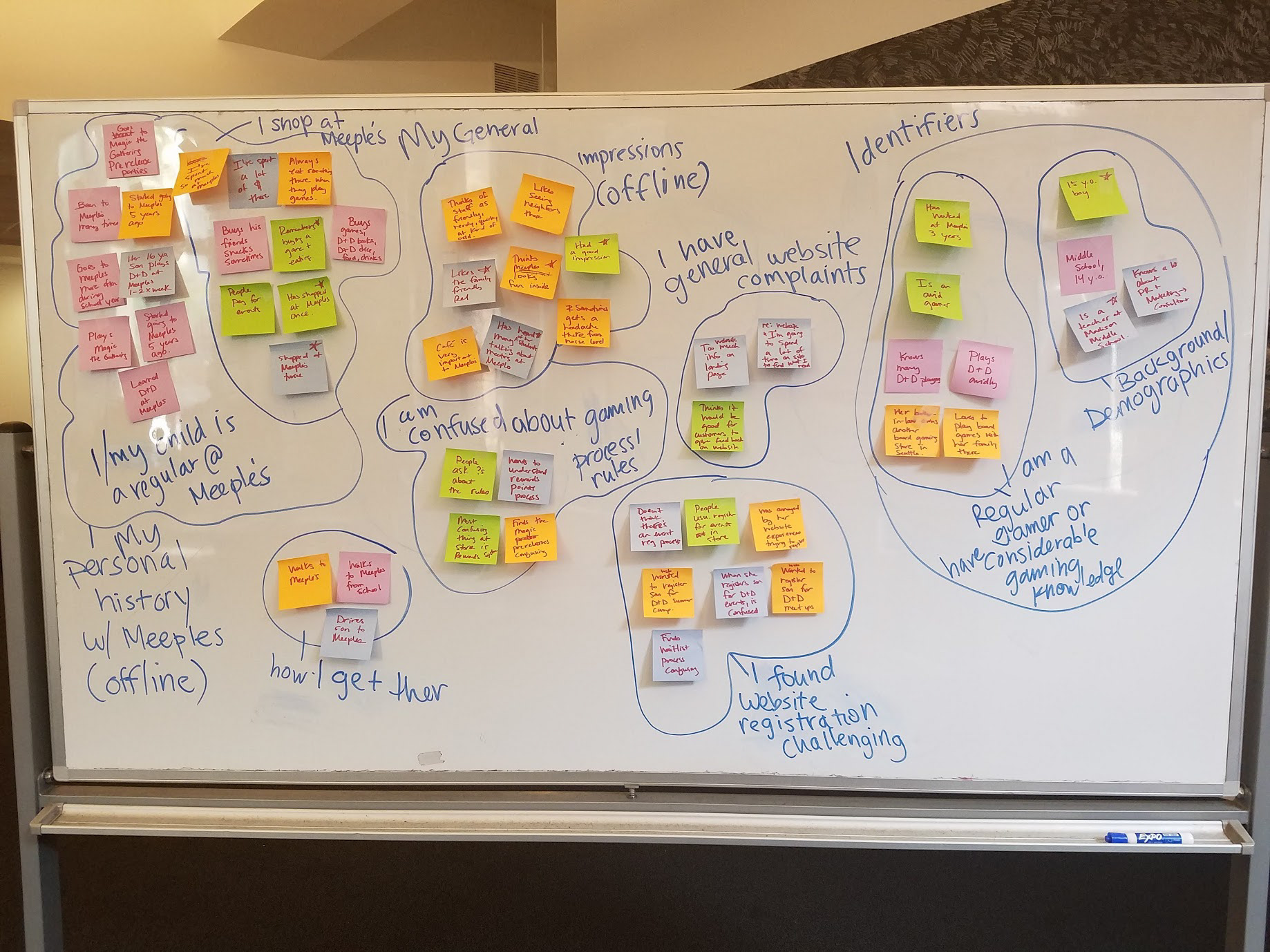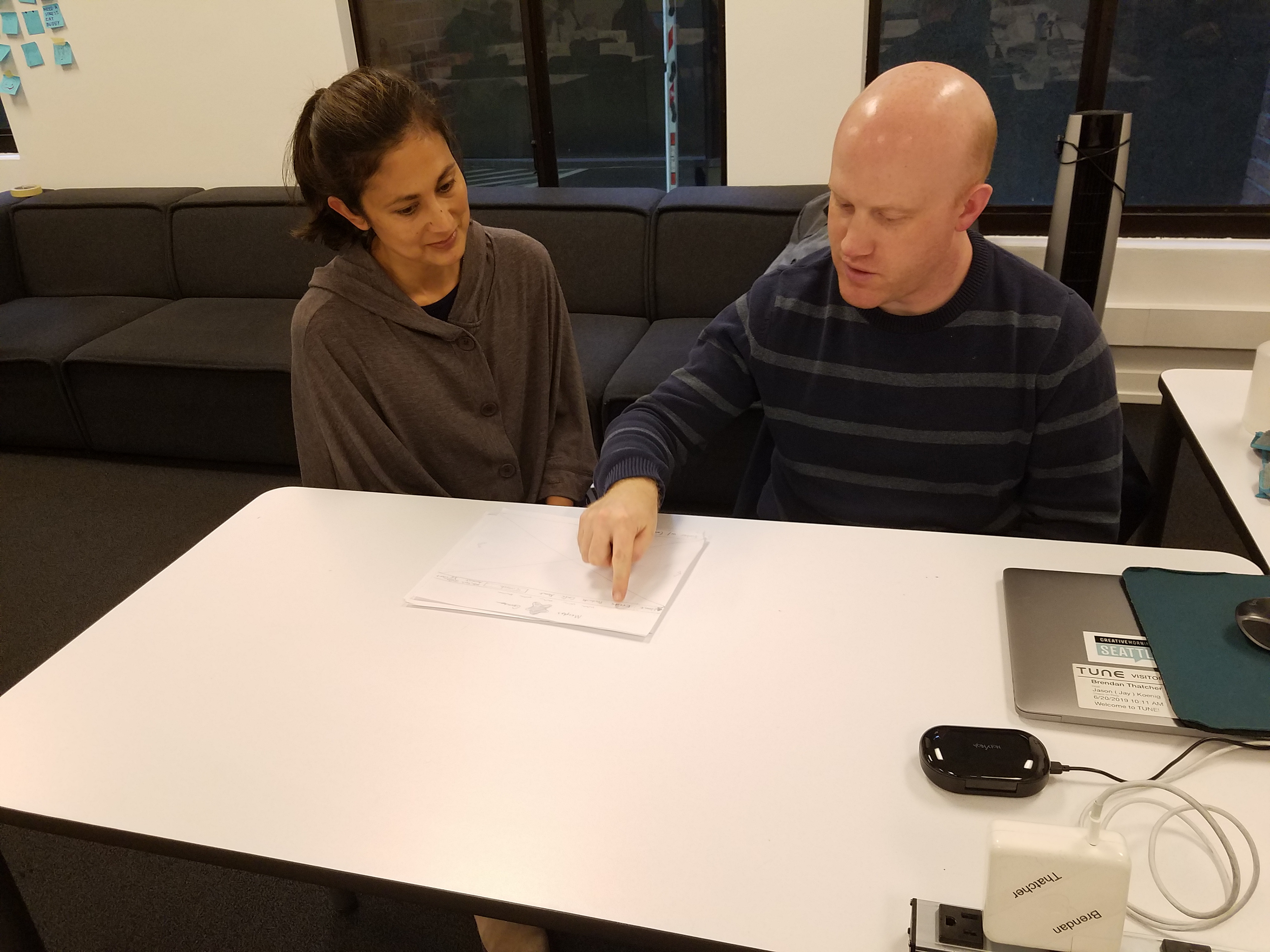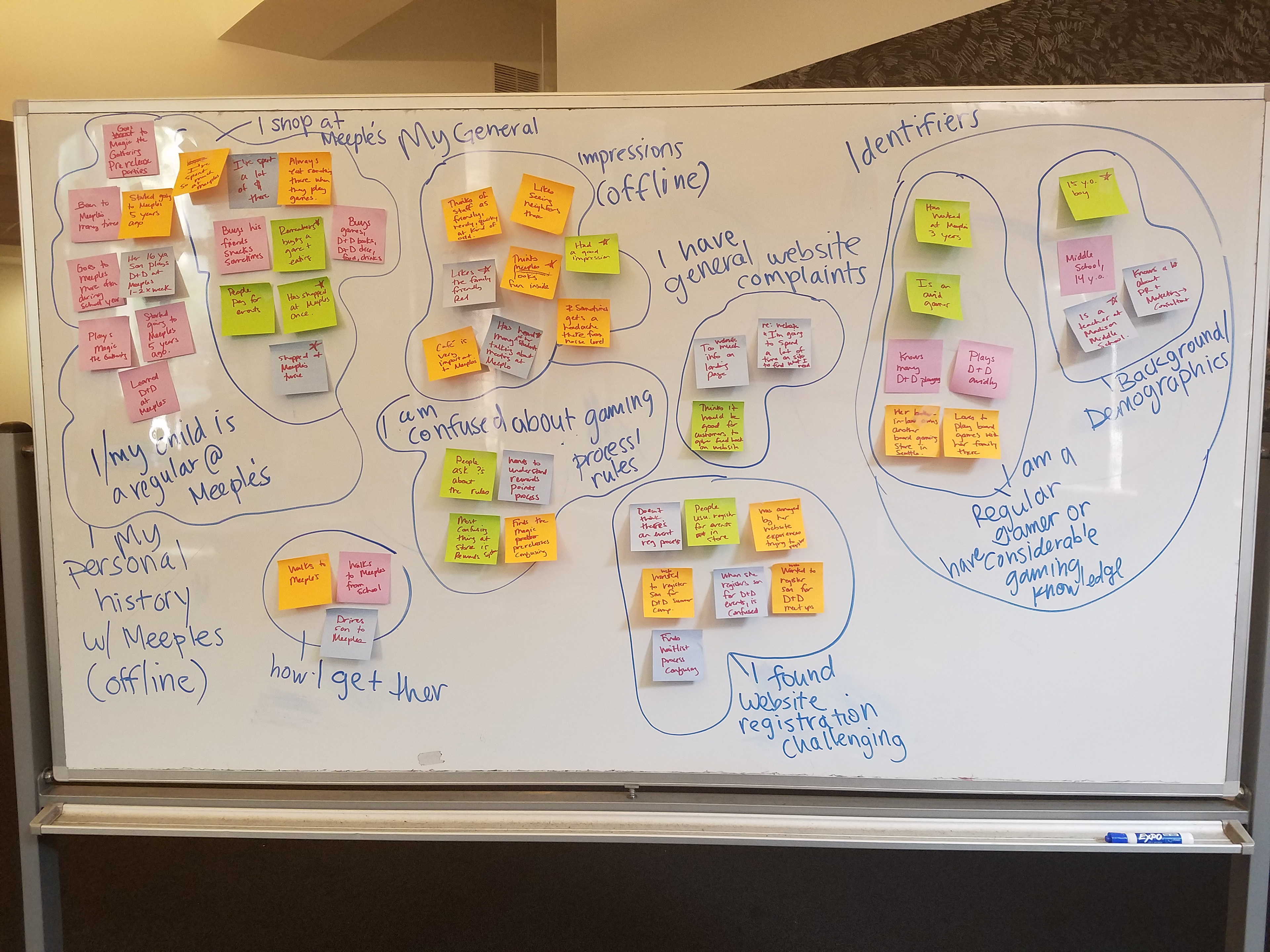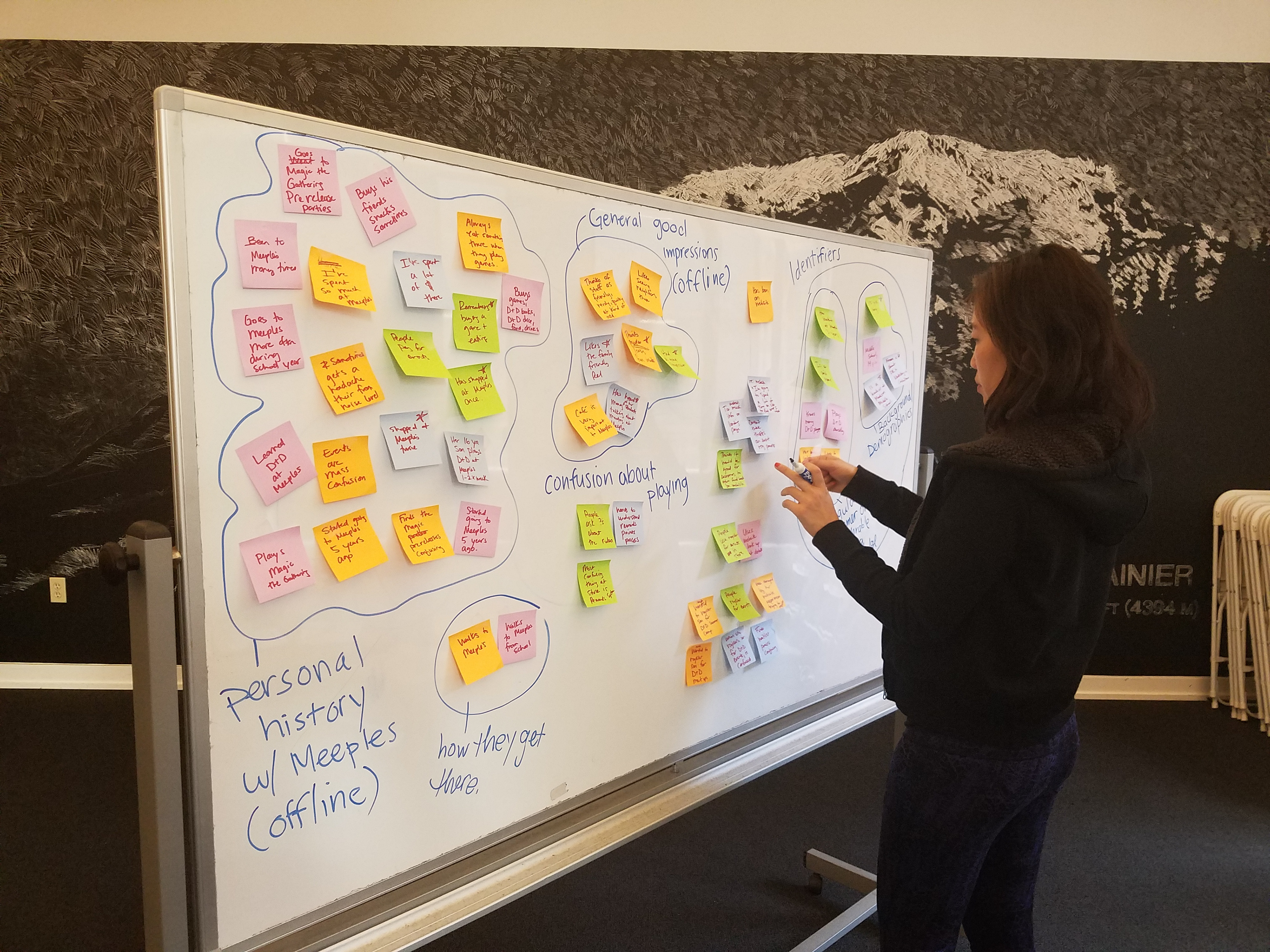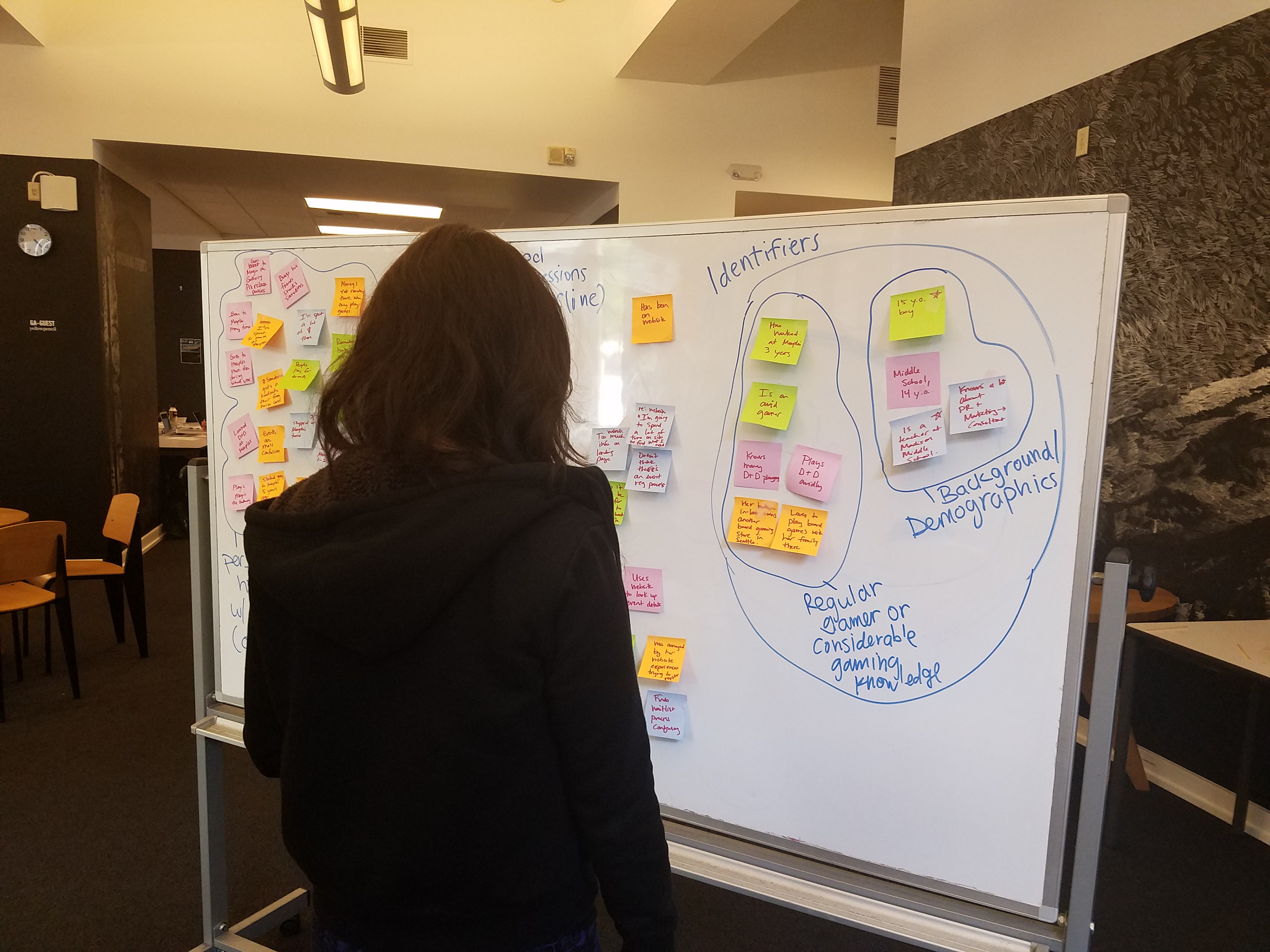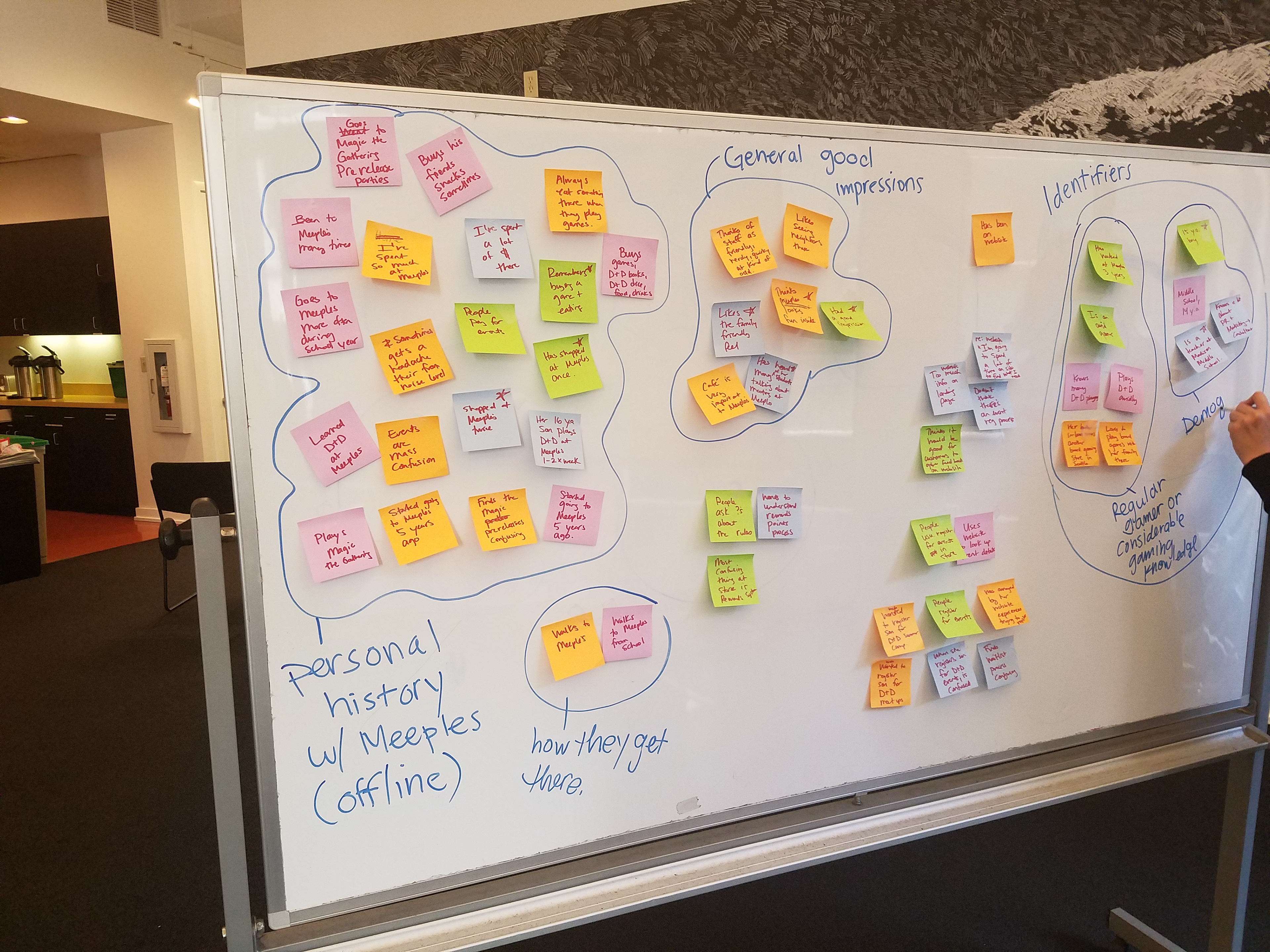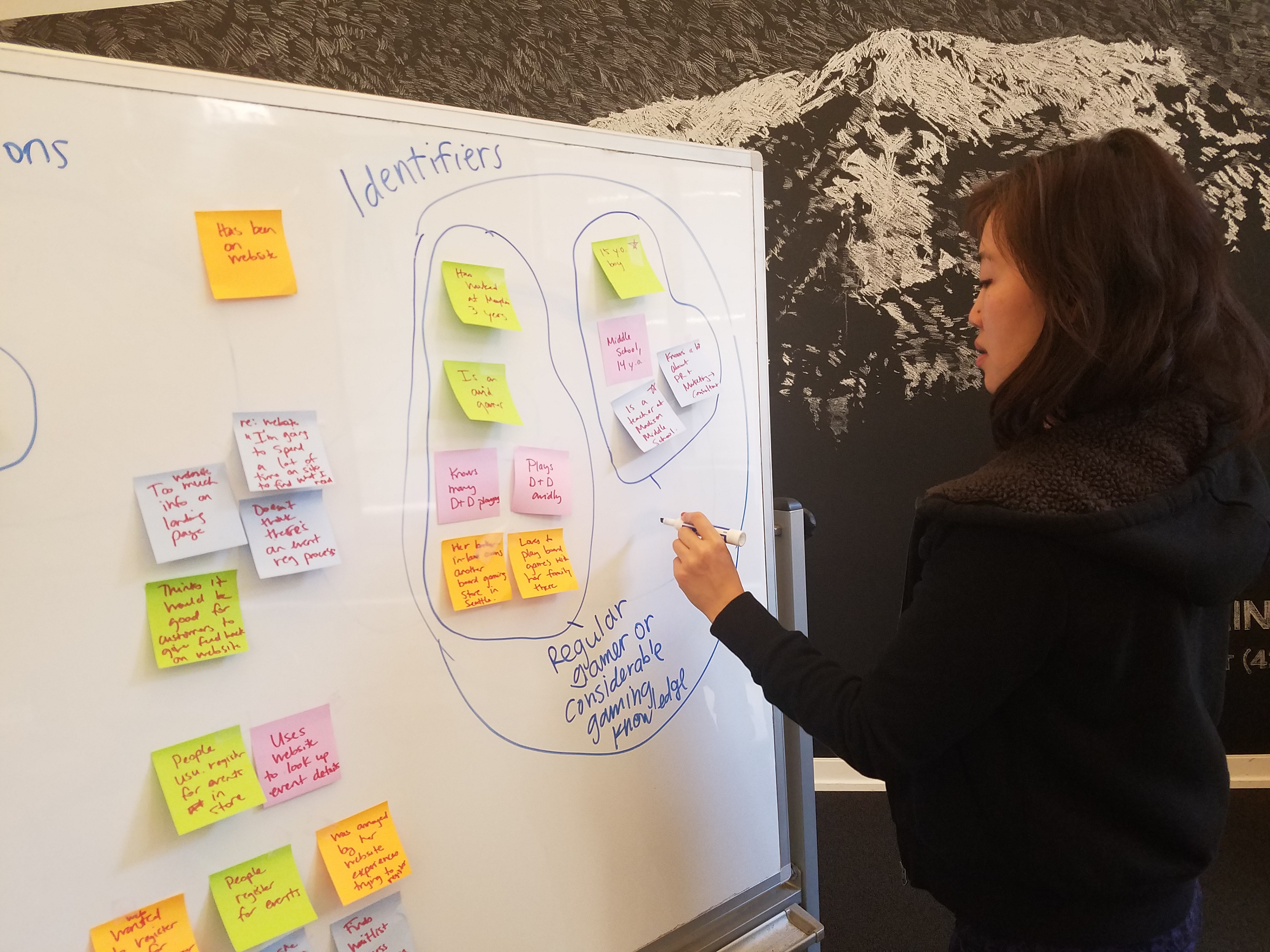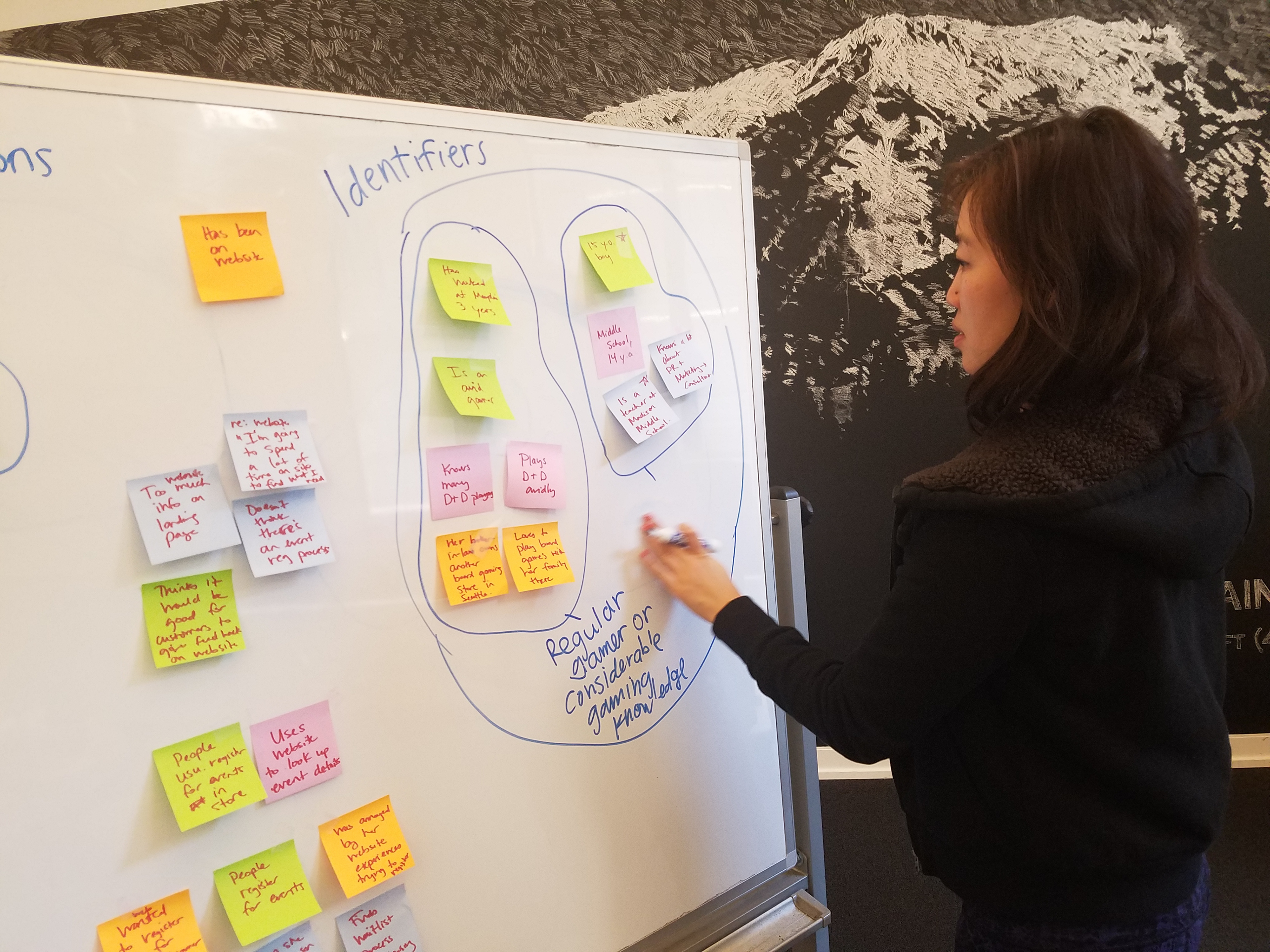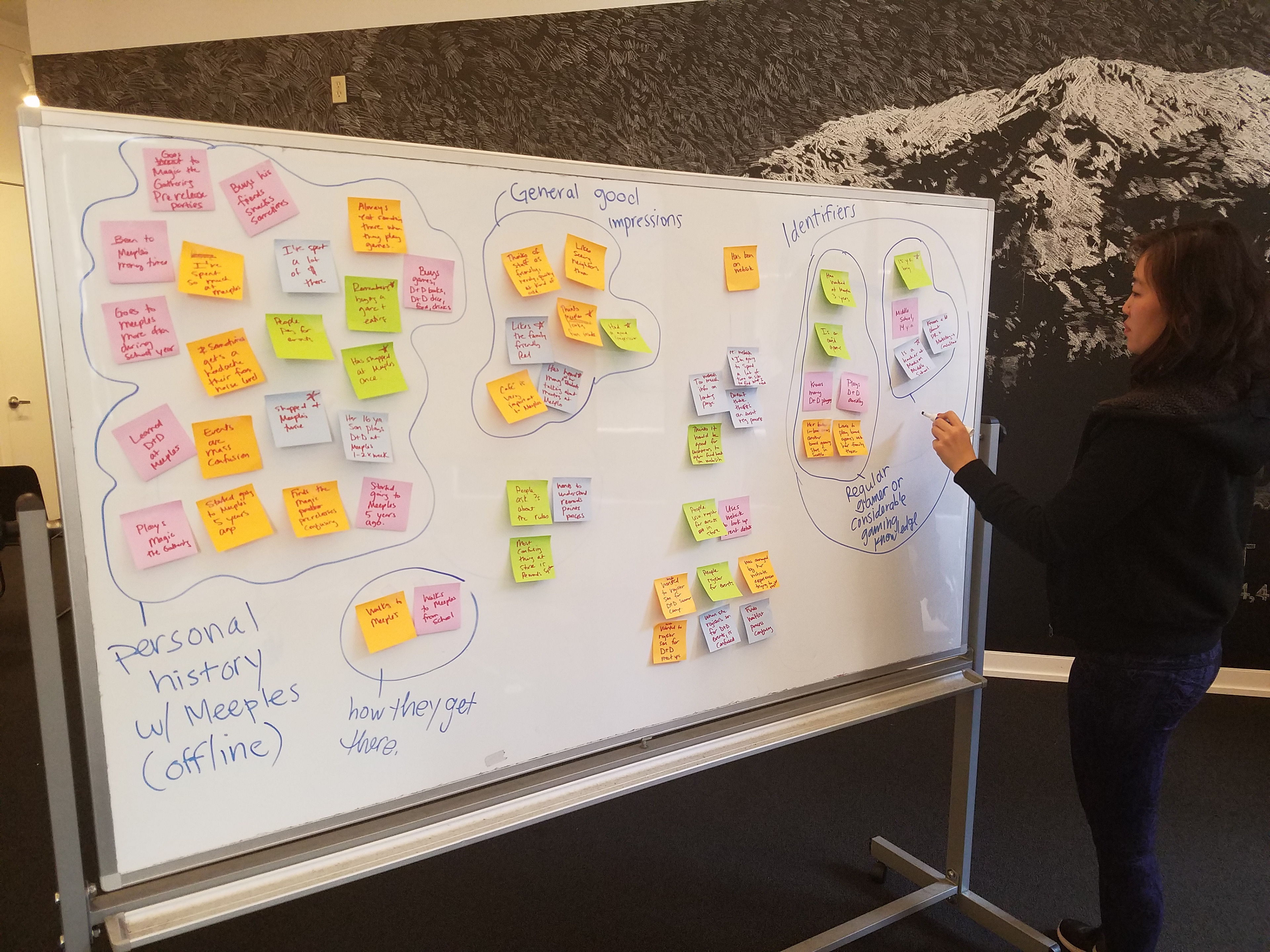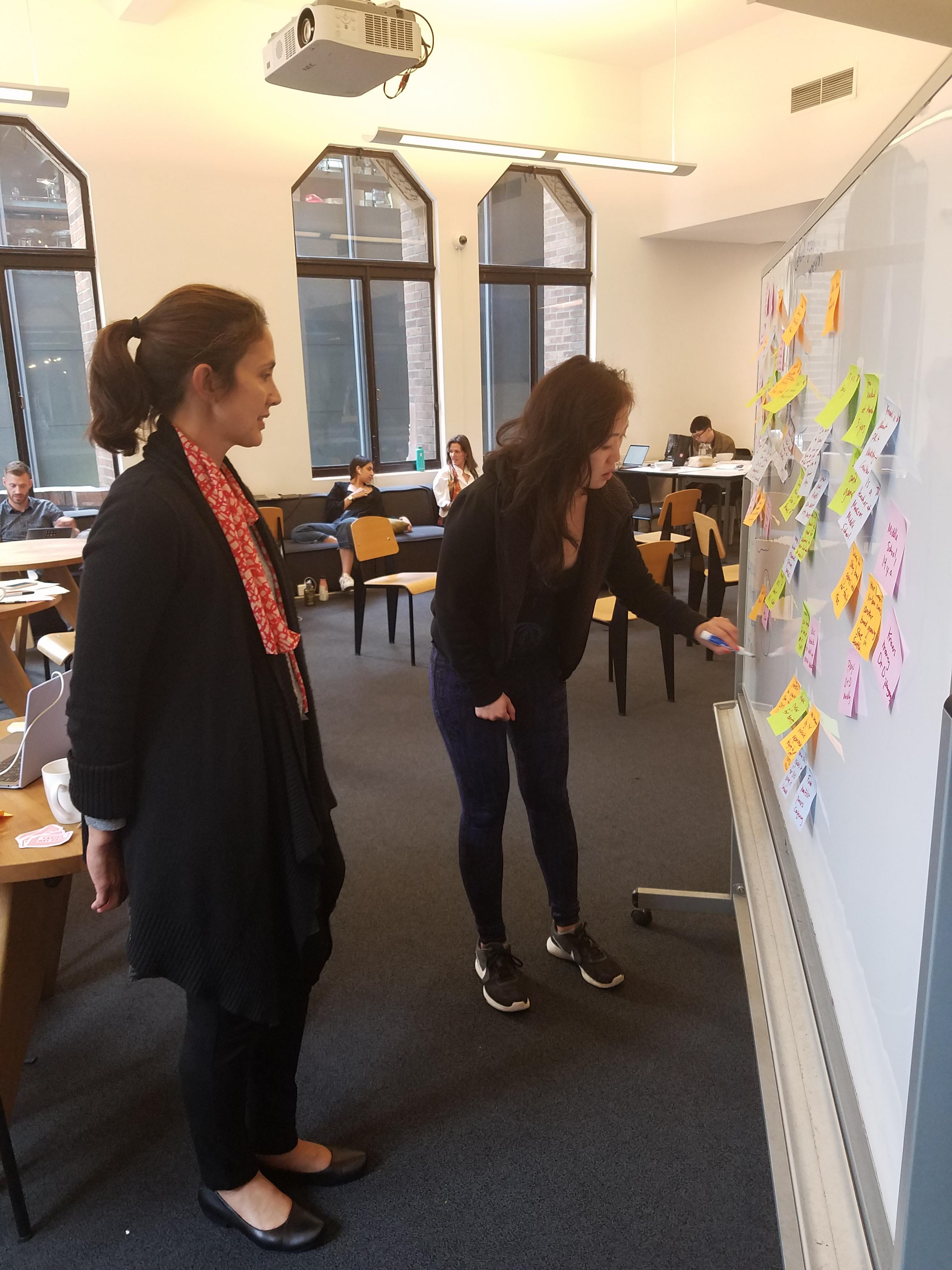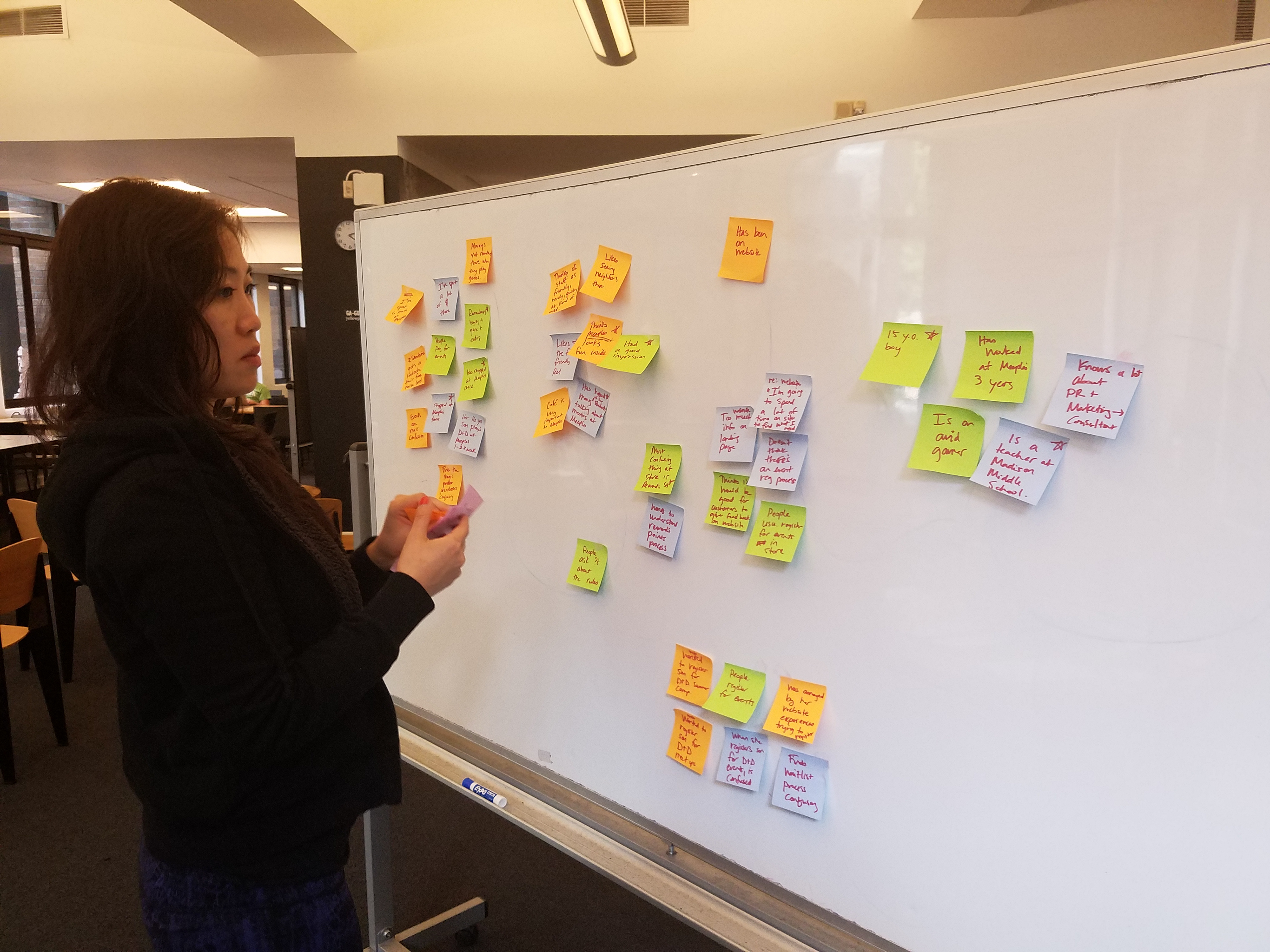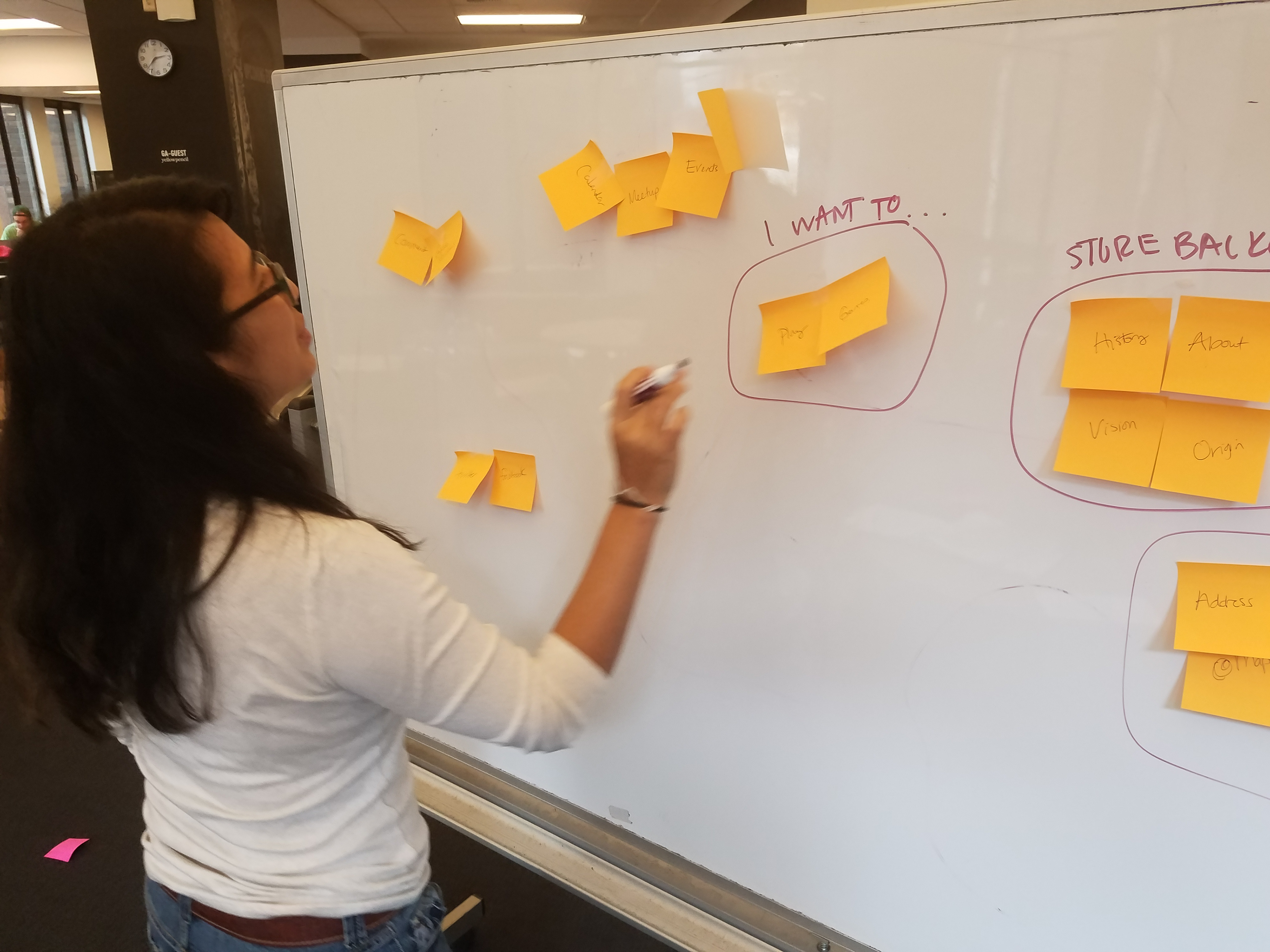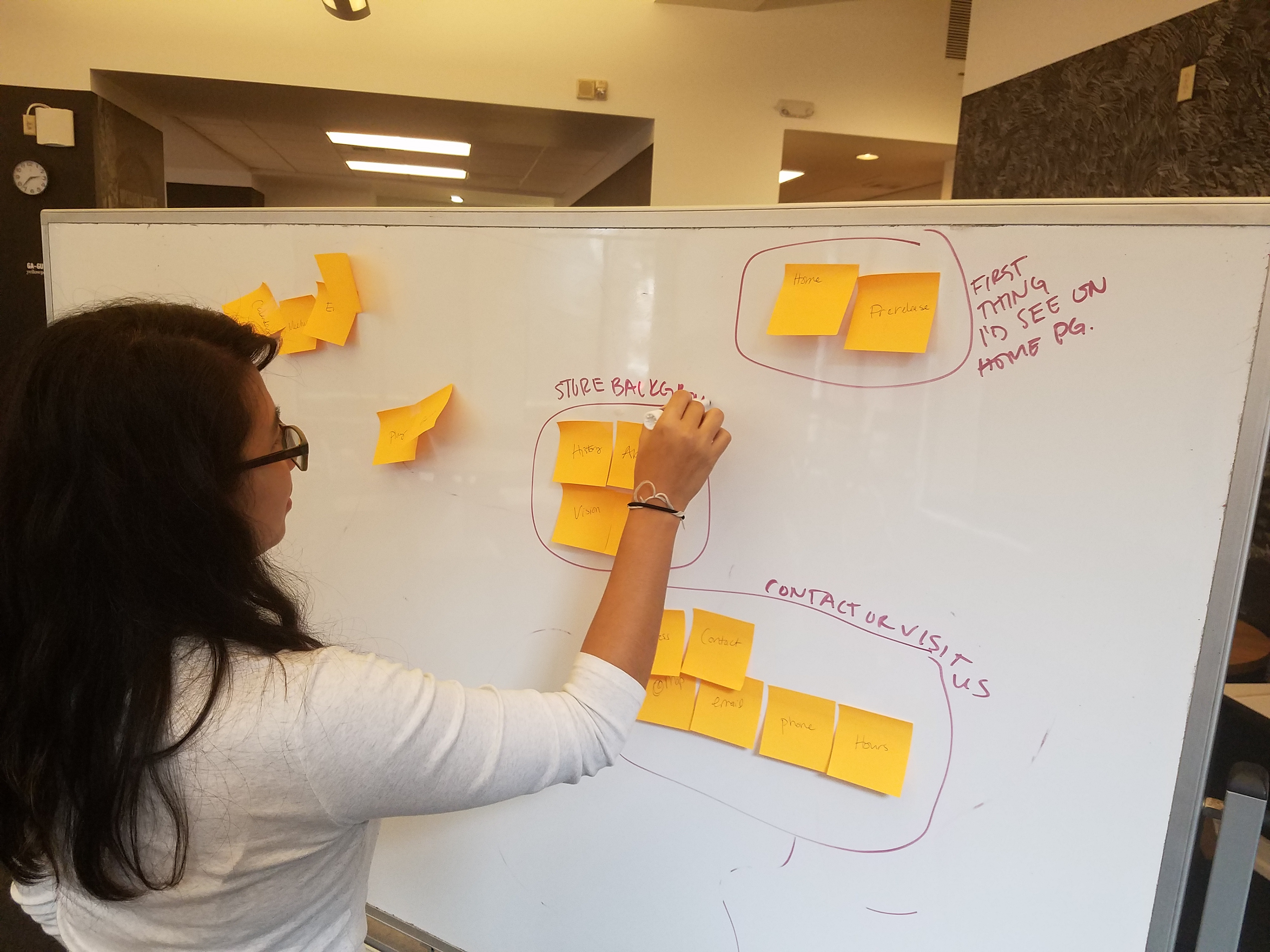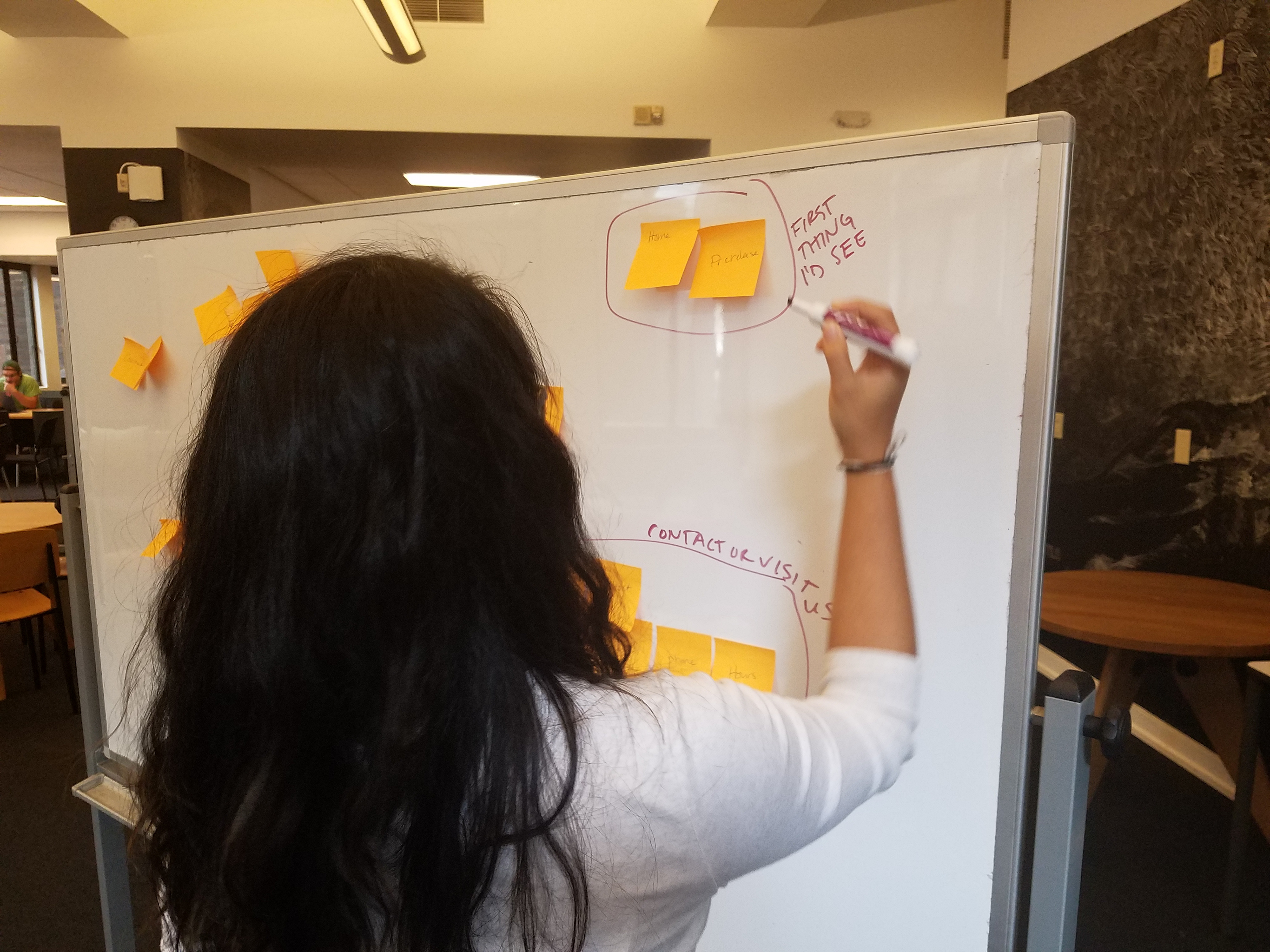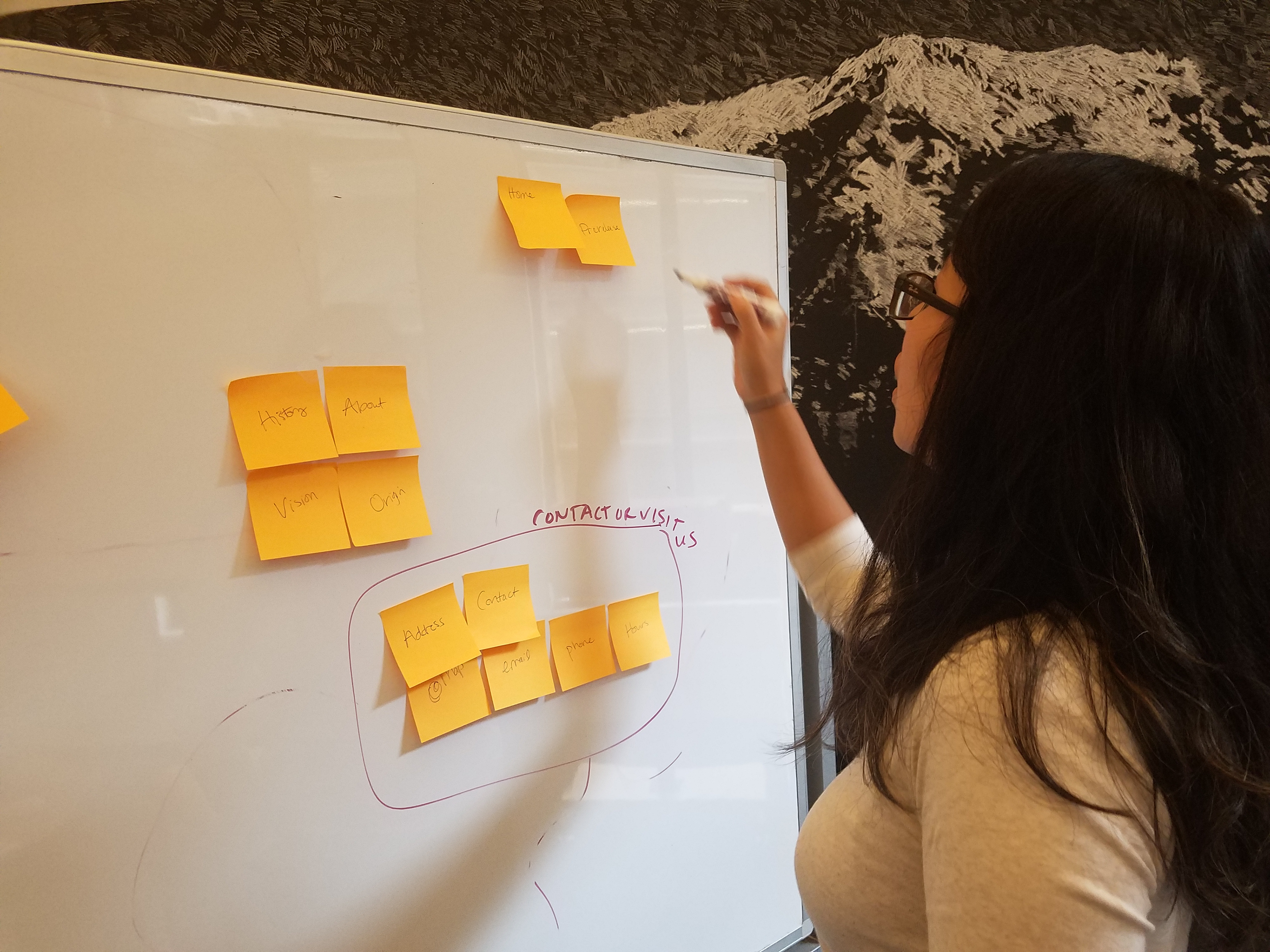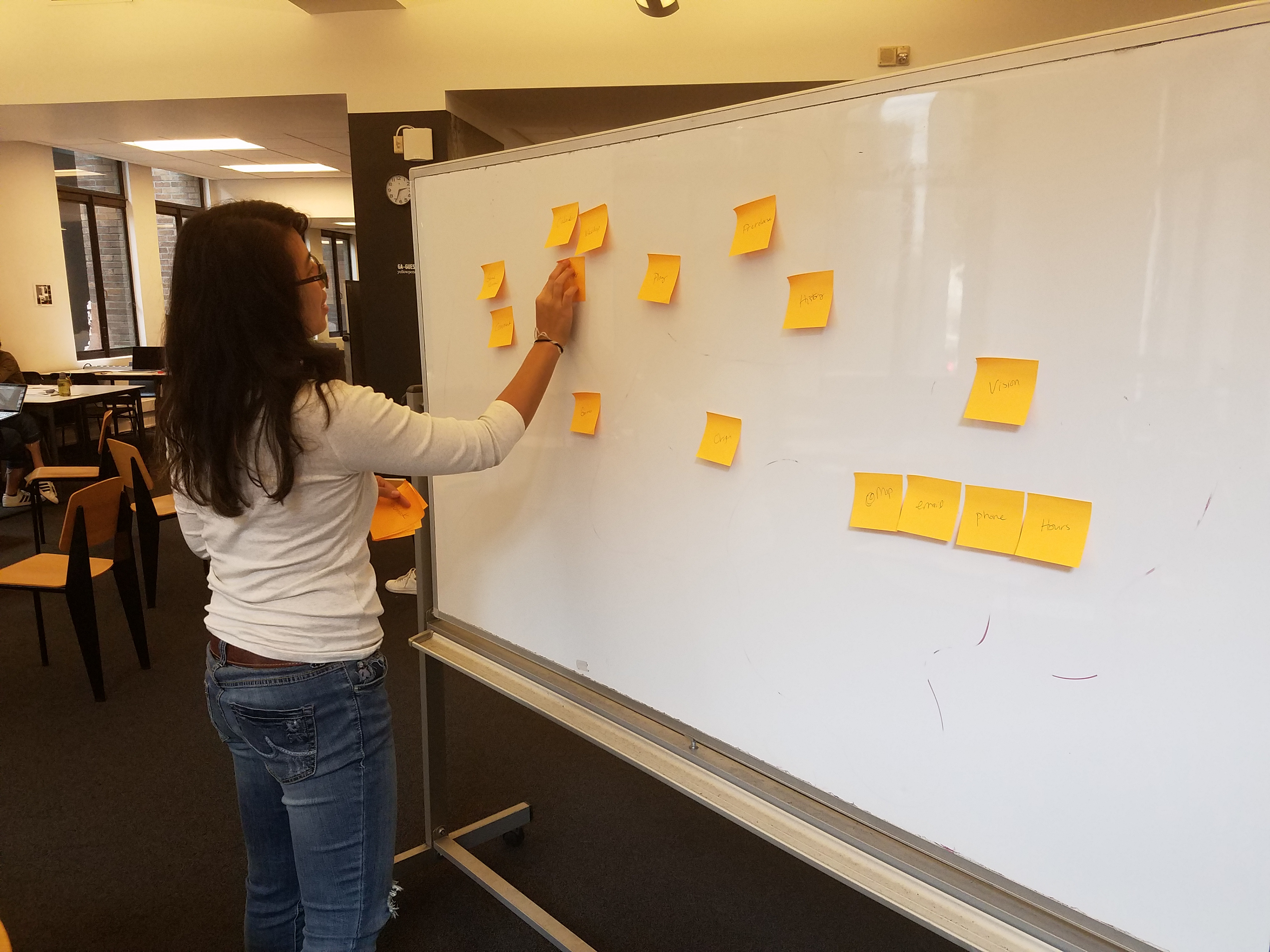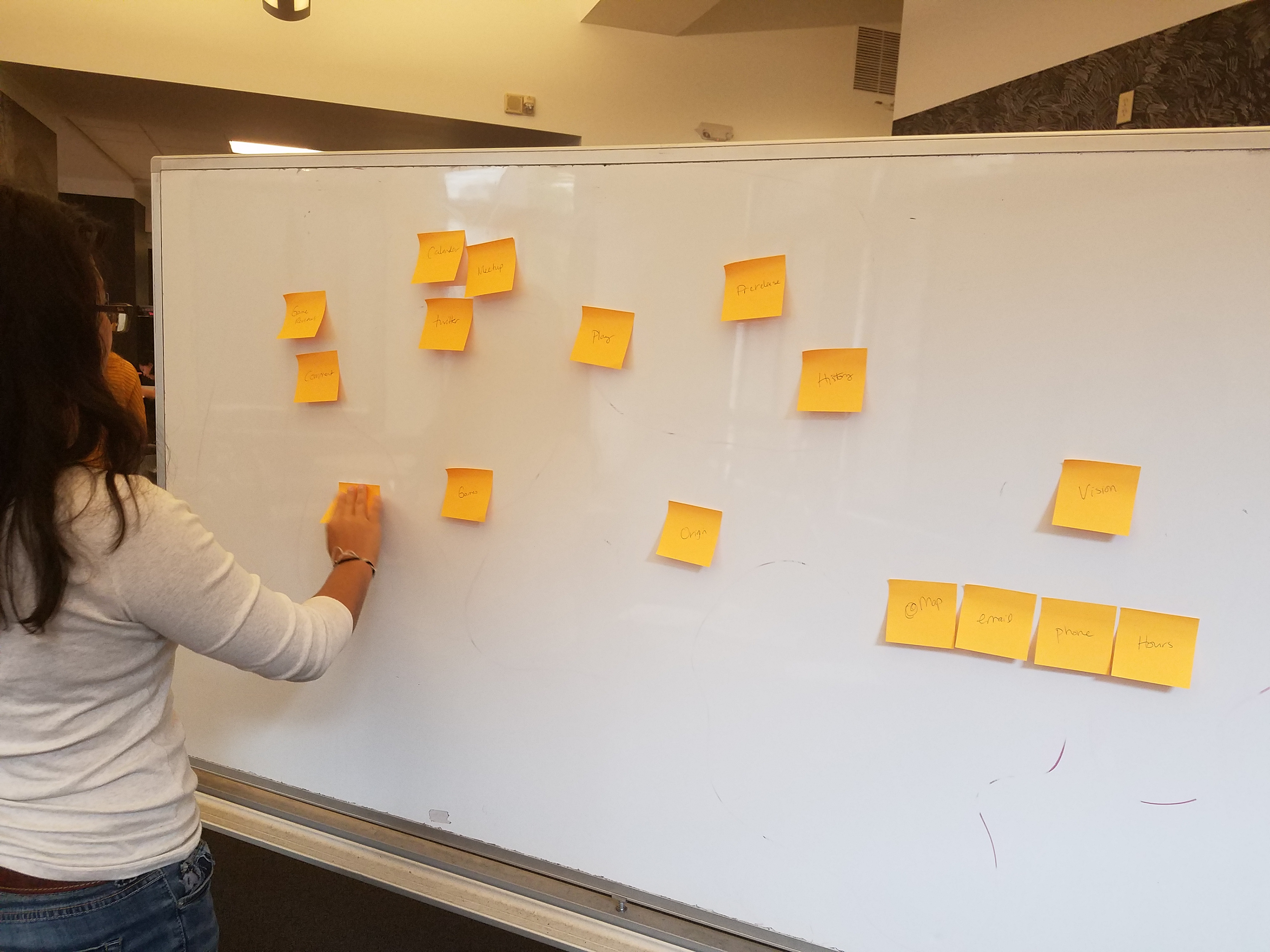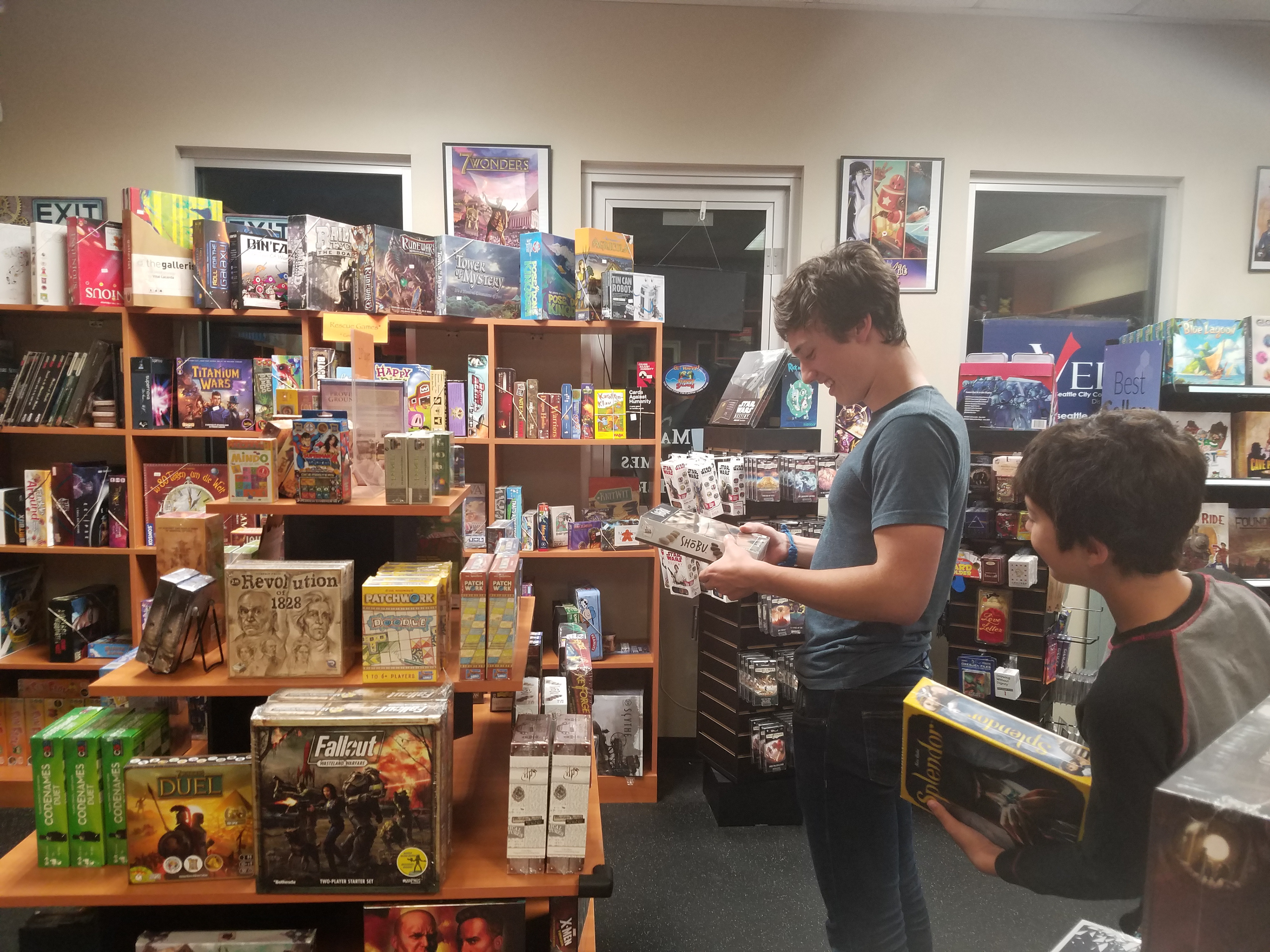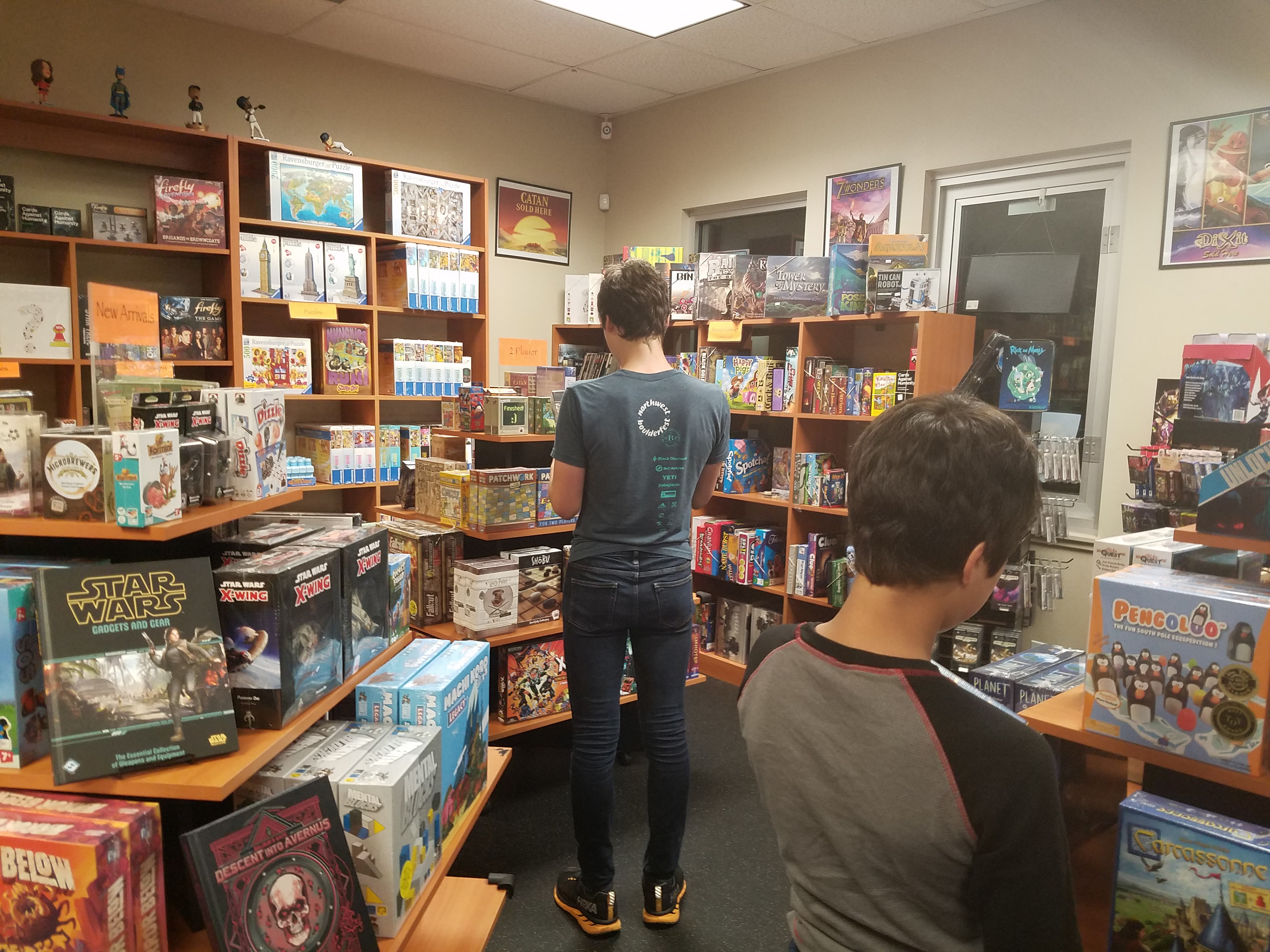Meeples Games
User Research and Usability Testing for the redesign of the Meeples Games website. As a gaming cafe and game retail location that did not have e-commerce on its site, I identified a need for e-commerce to complete events registration. As the solo UX Designer on this project, I was also the Interaction and Visual Designer.
Role: UX Designer
Duration: 2 weeks
Tools: Sketch, InVision, pens, pencils, paper, post-its, clipboard
Overview
I evaluated the existing website for Meeples Games, a local family friendly gaming cafe and games product store in West Seattle. My brief was to determine one way to add e-commerce to the site, which currently has no e-commerce capabilities. Discussions with users revealed a consistent love of the Meeples brand but a deep frustration with the event registration process and the shopping rewards points system. Users who wanted to register for events found that the online events links shunted them out of the Meeples site into a third party system where there was no way to officially register for the events.
Problem statement
Users need a reliable and thorough event registration process. The current process is inconsistent, is not online and involves making direct contact with the Meeples store owner through email, over the phone or in person.
Users and audience
The users who will benefit from a strong solution to this problem include all people who are registering themselves or their friends or family members for a Meeples event.
Roles and responsibilities
I was the UX Researcher and the UX Designer for this project. I worked alone.
Scope and constraints
I had 2 weeks to complete this work. I was given a list of 8 local businesses to choose from and given a group of 3 personas to choose from. We were directed to visit the business and interview staff members and existing customers.
Process and what you did
I began by exploring the Meeples website to see what I could learn from the existing information and structure. I found it to be difficult to navigate and difficult to understand exactly how the business earned money from the website. It was not even clear to me that the business sold games. From the site, I learned that Meeples sold food in a café and had space where people could play board games. I learned that Meeples offers a free lending library of board games. I learned that Meeples holds gaming events like Magic: The Gathering pre-release parties and tournaments, Dungeons and Dragons campaigns (games), family game nights, events specifically for teens and events specifically for tweens (aqes 9-12).
Additionally, I learned that the events landing page for the site is linked to the third-party business, Meetup.com. From Meetup, users could learn more information about each specific event. However, on Meetup users also learned that the only way to register for an event was to make direct contact with the store owner, through email, over the phone, or in person at the store.
Next, I visited the business. Before I spoke with anyone, I explored the space and saw that Meeples has a wide variety of games, game pieces and game handbooks for sale. It sells food in a bright, friendly café. It has a very large lending library of games. And it has a gaming room separate from the café space where people can also eat food from the café.
Then I interviewed users. I interviewed a total of 7 users:
48 year old mother: she has been going to Meeples regularly for 5 years, since it opened. She and her family play board games there and eat there. Her now 14 year old son—whom I also interviewed—learned to play Dungeons and Dragons there and currently goes there once or twice a week to play D+D or other games with friends, or just hang out and eat.
I interviewed the 28 year old staff member.
I interview a 54 year old mother of a 16 year old regular D+D player.
I interviewed a 42 year old mother of a 15 year old D+D player. She is also a Madison Middle School teacher.
I interviewed her 17 year old son, the D+D player.
I interviewed a 34 year old Madison Middle School teacher who does not have children.
Learnings
Notes from presentation
The parts of this project:
My User Research
-The problems I identified during my research.
-The ideal user flow for solving the problem I decided to focus on.
-An analysis of competitors in the gaming cafe and game store business.
-My suggestions for revising the website to address the problem I
chose to solve, including my revised site map.
-Usability testing on the proposed site changes.
-And Next Steps in the design process.
I was able to conduct user research in the store and cafe. Before I spoke with customers or staff, I explored the Meeples space. There’s a wide and enticing selection of games, action figures and cards. A great collection of game handbooks. A popular gaming room. And plenty to snack on, including candy, And items off their generous menu in their friendly cafe.
Then I began interviewing Meeple’s people. I conducted 7 user interviews. My users ranged in age from 14-54, and included
5 adults
- and 2 teens.
The adults included
-3 parents,
-2 current Madison Middle School Teachers
-and 1 Meeples staff member.
I also spoke with 2 teenagers.
Both are really into Dungeons + Dragons and
one is a student at Madison Middle School.
During the interviews, I learned that Madison Middle School,
a big Seattle public school, is only a six minute walk away from Meeples.
Many people at the school know about Meeples, visit Meeples, shop at Meeples and play games at Meeples. One of the Madison teachers told me she regularly hears her kids discussing going there after school to hang out with friends, play games, eat, and meet their parents when they get off work. One of the teens I interviewed told me he’s been going to Meeples for five years, and now that he’s old enough, he goes there once or twice a week during the school year.
During the interviews, I learned that Madison Middle School,
a big Seattle public school, is only a six minute walk away from Meeples.
Many people at the school know about Meeples, visit Meeples, shop at Meeples and play games at Meeples. One of the Madison teachers told me she regularly hears her kids discussing going there after school to hang out with friends, play games, eat, and meet their parents when they get off work. One of the teens I interviewed told me he’s been going to Meeples for five years, and now that he’s old enough, he goes there once or twice a week during the school year.
There’s a very prominent white board directly behind the cash register that lists the Meeples events of the day and you’ll notice the first event listed here is Tween Dungeons+Dragons. It became apparent to me during user research that most of the Tweens who attend the 4 o’clock programs at Meeples are students at Madison Middle School. For those of you who may not know, the term Tween refers to kids ages 9 - 12.
The Madison student I interviewed is 14 and he said he and his friends usually play Dungeons and Dragons, but sometimes they’ll play a board game from the free library.
I had the help of a new set of users in creating an affinity map of my findings from the Meeples users research.
Every Meeples user I interviewed had some very positive things to say. One parent even said, “I’d buy stock in Meeples if I could.”
Almost all of the users had been on the website and all but one who had been on the website found the way it’s currently organized and labeled to be confusing. And it’s important to remember there’s no e-commerce on the site.
One issue that came up three times was the subject of Meeple’s Peakville Shopping Rewards Points. Users don’t understand how they earn points and how to redeem them. The staff member, in particular, said it was the subject she gets questioned about most and she doesn’t have access to any of the rewards point data herself. Meeples uses a third party to keep track of reward points. When asked how she would improve the website, the shopping rewards points were the first thing she brought up.
This event registration process was the biggest problem for the three parents I interviewed. One parent even told me that it took her years before she felt comfortable just dropping off her kid outside Meeples. Instead, she’d always walk in with him to make sure he was actually registered in the event he wanted to attend.
This is Meeples existing Events Landing page. When a user clicks on a link, they get sent off of the Meeples site….
To the Meetup page. Meetup is another third party and users assume if they click register from this page that they’re confirmed for a particular event. Actually, though, Meeples doesn’t collect any registration data from Meetup. If you read the fine print, customers who want to attend an event will still need to call, email or go into the shop to speak with the owner of Meeples to actually register.
Which brings me to the primary problem I discovered. Customers need a clear process for event registration at Meeples. The current process uses a third party vendor to publicize events but users can’t actually register or pay online at all.
Parents who are protective of their kids and need to establish trust with a business feel frustrated and even worried by the current system.
My goal became to design a website that would make it easy for a new user to register for an event completely online. The new system would need to inspire brand confidence in the user.
My hypothesis is that these changes will increase customer loyalty and make event management much easier for staff members, too.
Before I get to how we can solve the event registration problem, let me introduce you to John Goodson. John is an ideal customer for Meeples. He’s a 38 year old school teacher and a single dad. He shares custody of his daughter with her mother.
He wants to feel a strong sense of connection to businesses where he shops. In fact, he’s a loyal customer when he feels like he has a real relationship with a brand and especially when he trusts that they have his best interest at heart.
John has strong opinions about websites.
-He says, “I won’t spend a lot of time trying to find what I need on a site.”
This is Maya, John’s daughter. She’s 12 years old and a 7th grader at Madison Middle School. It doesn’t take long to hear Maya’s priorities.
-”I just want to hang out with my friends after school.”
-And “I only go on sites to see stuff like dates and times when things start.”
Maya tells John all her friends get to walk to Meeples after school and play Dungeons and Dragons. She wants to go, too.
But Maya is the most important thing in John’s life and he’s having a hard time letting her do things like that on her own. He knows he’s supposed to give her more freedom now that she’s older and he trusts Maya, but just can’t trust the unknown.
He also still wants to be part of Maya’s life.
But “I need something we can do together” he tells Maya when she tells him she wants to learn D+D, a game John has never tried playing.
With the help of the people who tested my initial design sketches, I worked hard to design a gentle user flow that is just right for parents of kids, in particular.
They want Meeples to respect their time but also reassure them their child will be safe when they’re at Meeples.
While I drew several iterations of user flow sketches, I changed the flow through the sign-in and payment process several times and didn’t create a final sketch that matches my wireframe prototype.
The first interesting thing I found when doing an analysis of Meeple’s competitors is that the mix of products each business offered was slightly different.
When you enter Meeple’s, the first thing you see is a wide selection of traditional board games for sale and board games to check out from the library. In contrast, some local gaming cafes started up focused on video games, some were built up around comic books, and others focused first on music and entertainment. In all, I looked at 9 different local businesses that could be considered gaming cafes. The biggest takeaway from my research is that those most like Meeples offered personal online accounts and shopping rewards systems that users can access from their online account.
As I thought through the best way to simplify Meeples website, I compiled a list of labels and titles from the existing site then asked users to help me conduct a card sort.
In the end, the site map I developed feels very streamlined and friendly.
Next came sketching ideas for the revised website, building a working prototype and conducting usability testing. Based on feedback, I rearranged some of the steps in my checkout process and made sure to call out what pieces of information were required to make a purchase.
This is the home page of my redesign for Meeples Games. When our friend John arrives on this page to see where Maya wants to go after school, he’s happy about what he finds. Everything feels clean, simple and easy on the eyes. He quickly learns Meeples has a cafe and a free board game library. Since the Dungeons and Dragons after school program that Maya wants to join ends at 6pm, John has a great idea. He’ll register Maya for D+D, then, every Wednesday when he picks her up after work, he and Maya can have dinner in the cafe and play a game together before going home.
Let’s take a look at the process John goes through to find out more about the Dungeons + Dragons program.
John clicks on the events page. He quickly scans the page looking for a heading that applies to Maya, who’s 12.
He navigates to Tween events then scans the events listings to find a Dungeons and Dragons program that will fit into his after work schedule. He wants to learn more about the session starting Wed, Oct 2. Skimming through the event description. He feels reassured that Maya will be in good hands at Meeples. He decides to register her for the campaign and is taken to his cart. From here he’s given the option to sign-in or create a new account. He sees a special note for parents of tweens saying they must have an account. Again, John feels good about Meeples because he knows they’re making every effort to keep his child safe. He sets up his login information and creates his account.
He’s given another opportunity to review his cart where he sees he’ll earn reward points then proceeds to checkout.
He adds his payment information.
And now, every Wednesday after school, Maya walks with her friends to Meeples, plays Dungeons and Dragons, then has dinner with her dad in the cafe.
This gives you an idea of what the redesigned Meeples events landing page would look like in higher fidelity.
And in fact, that’s the next step in this process. Creating a higher fidelity prototype and continuing with the usability testing.
Man - Photo provided by General Assembly
Girl - Photo by Etty Fidele on Unsplash
Gentle river - Photo by Martin Sanchez on Unsplash
[add to images gallery, all the persona details from John Goodson’s image screen, but in new layout for my presentation]
